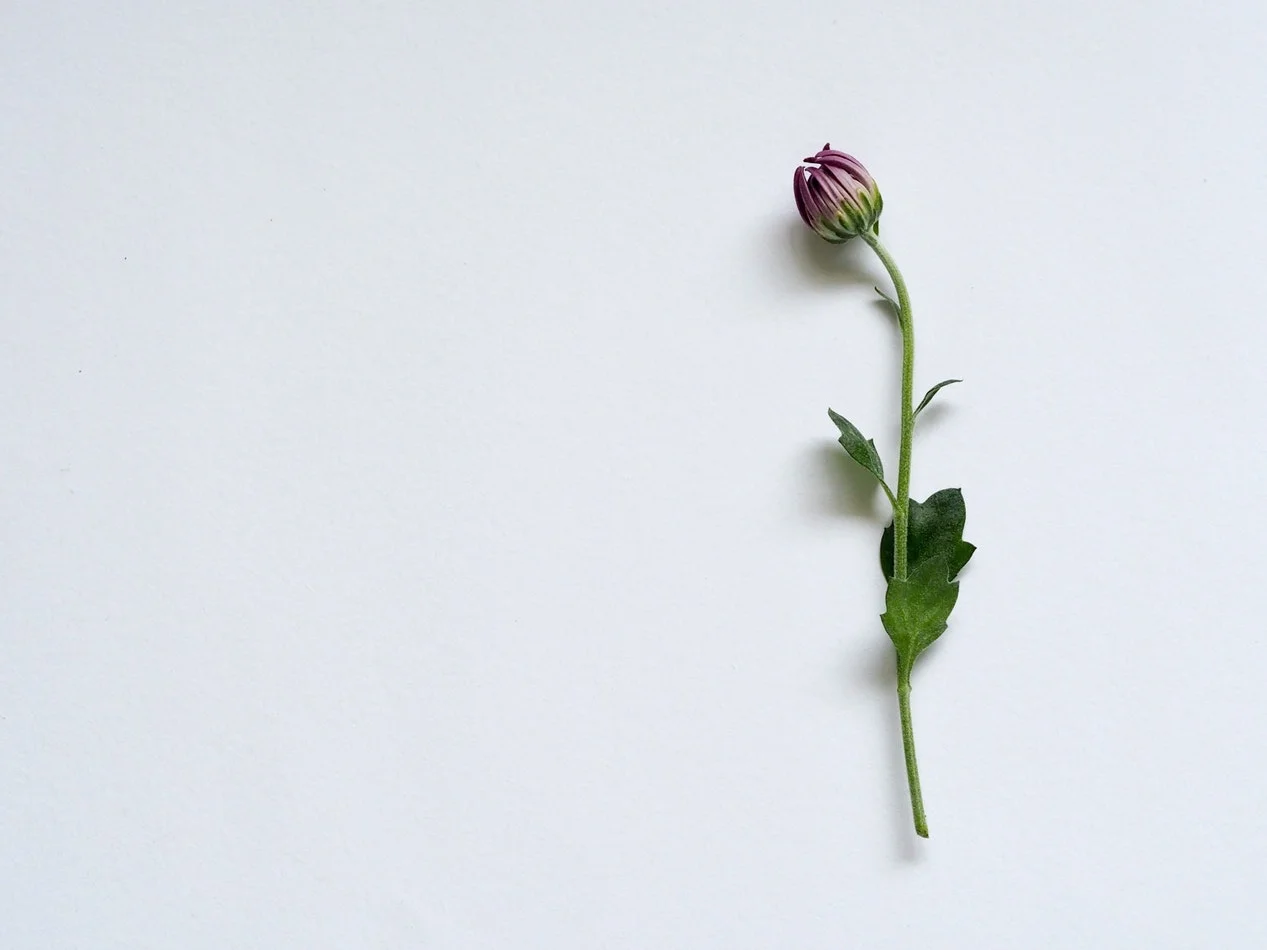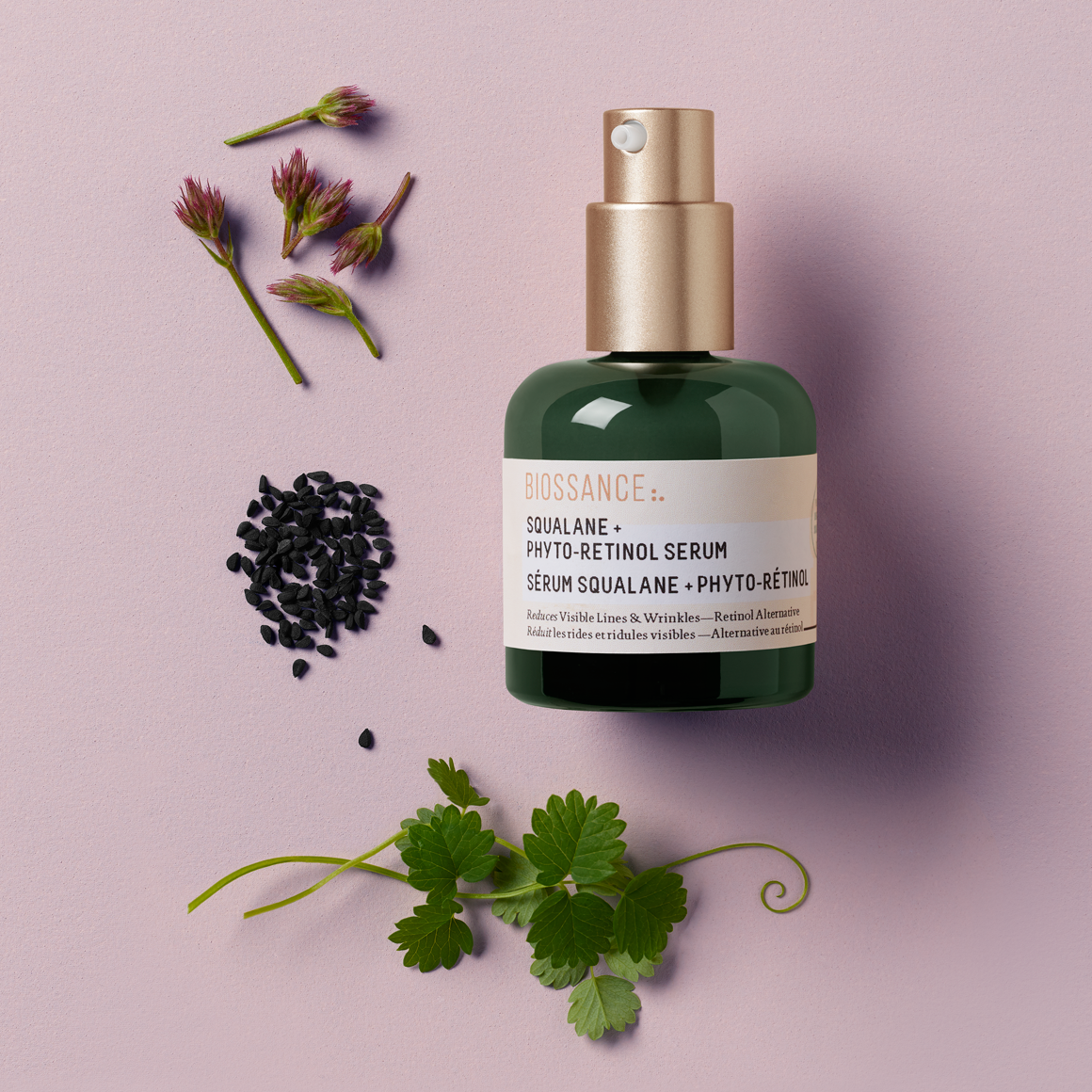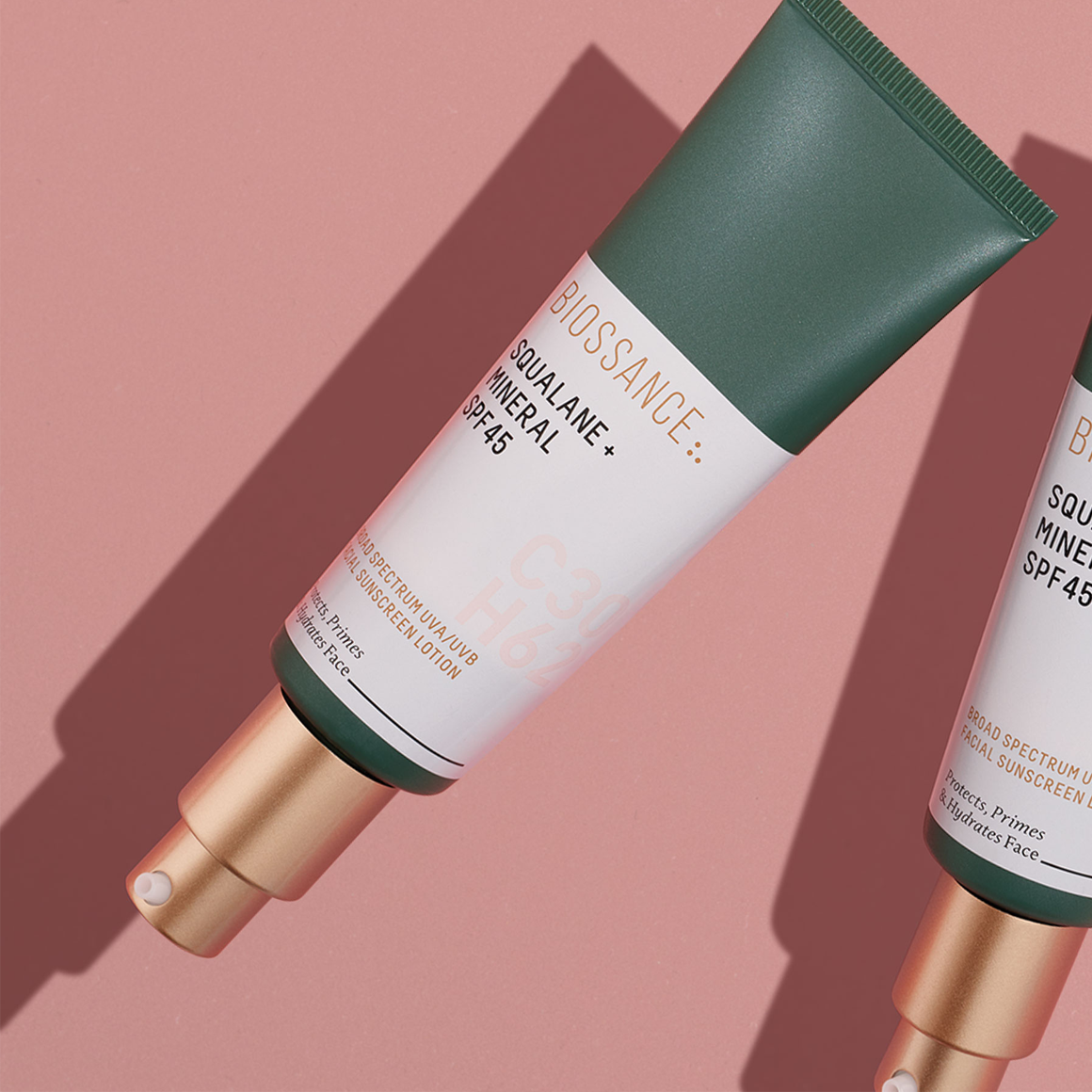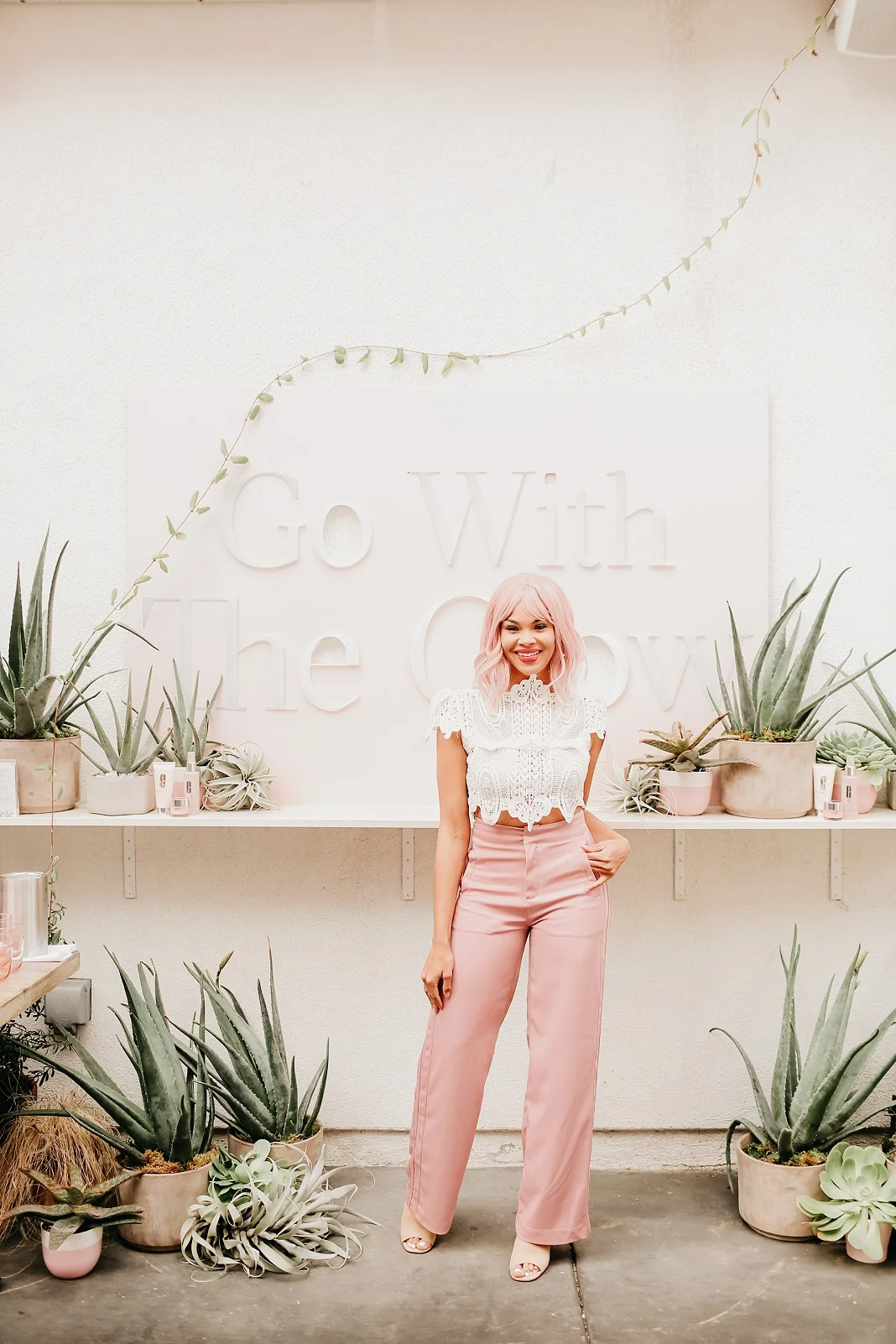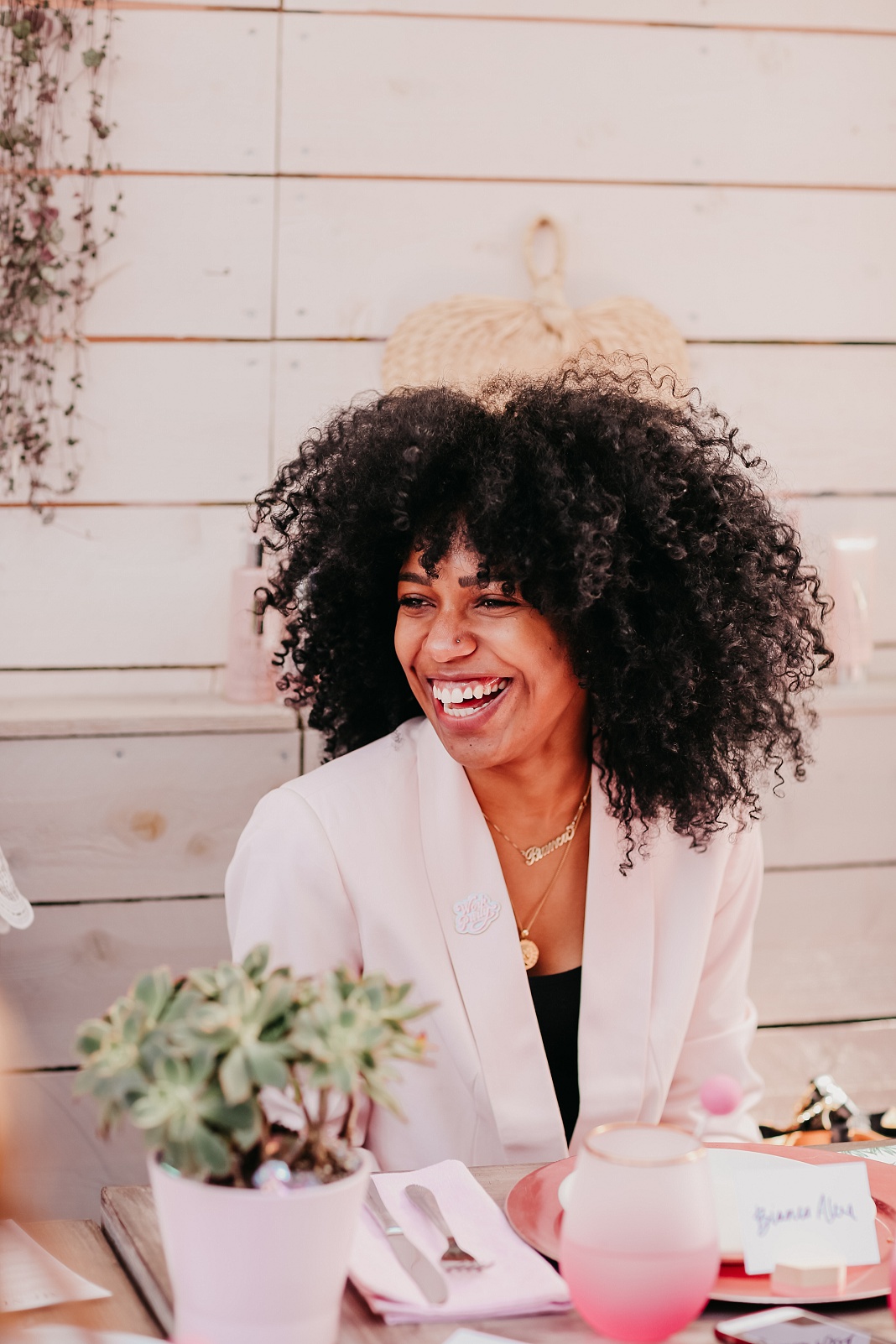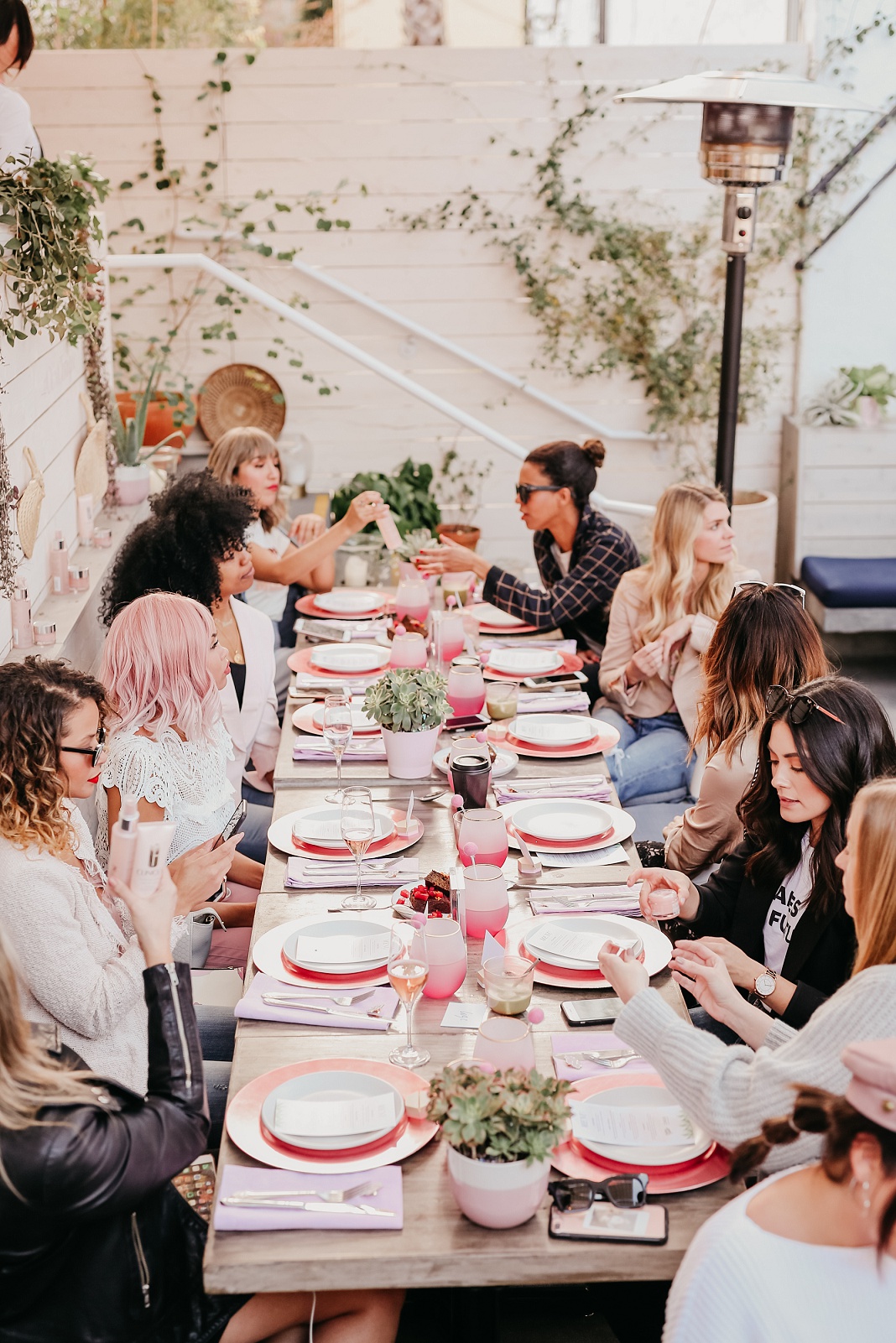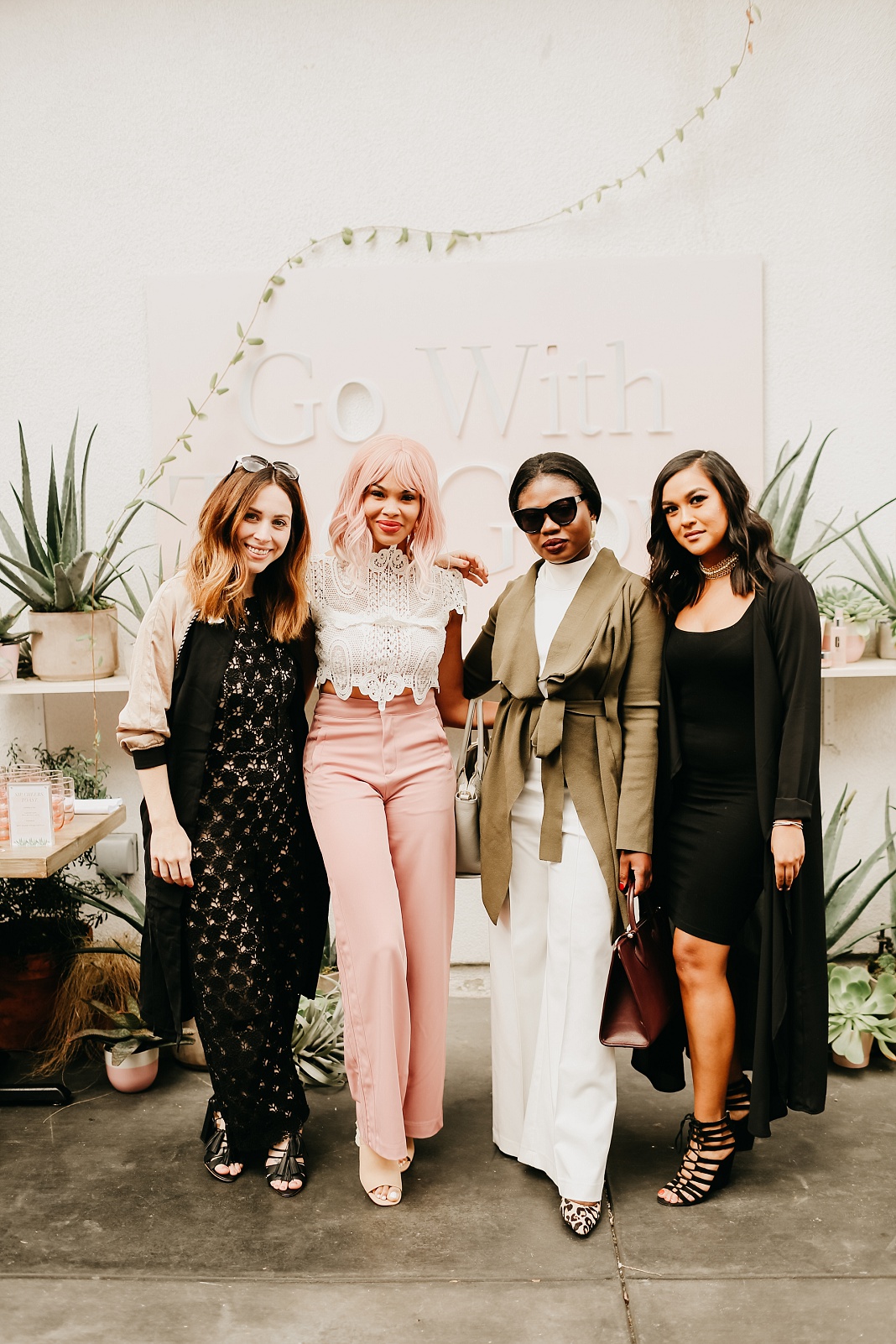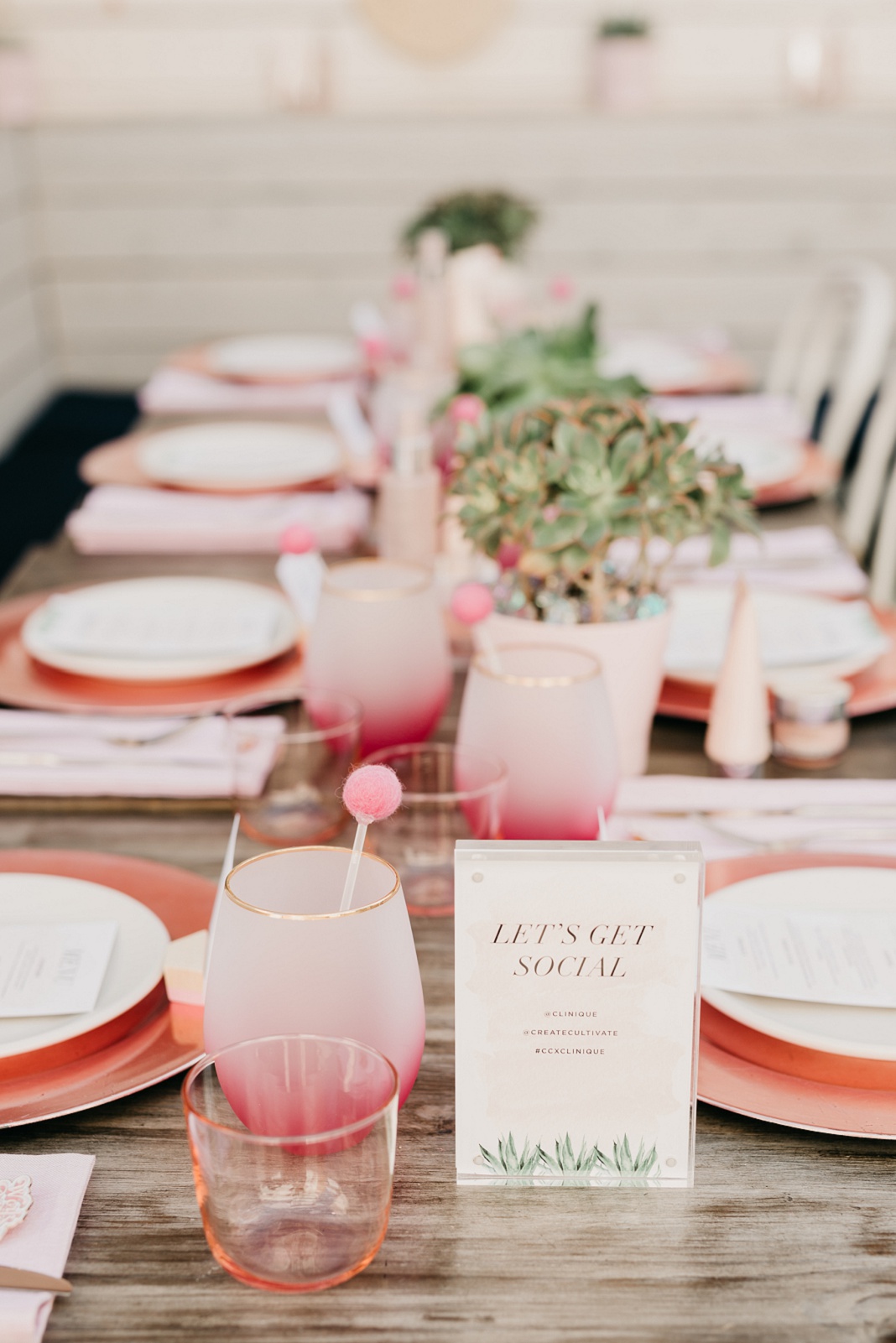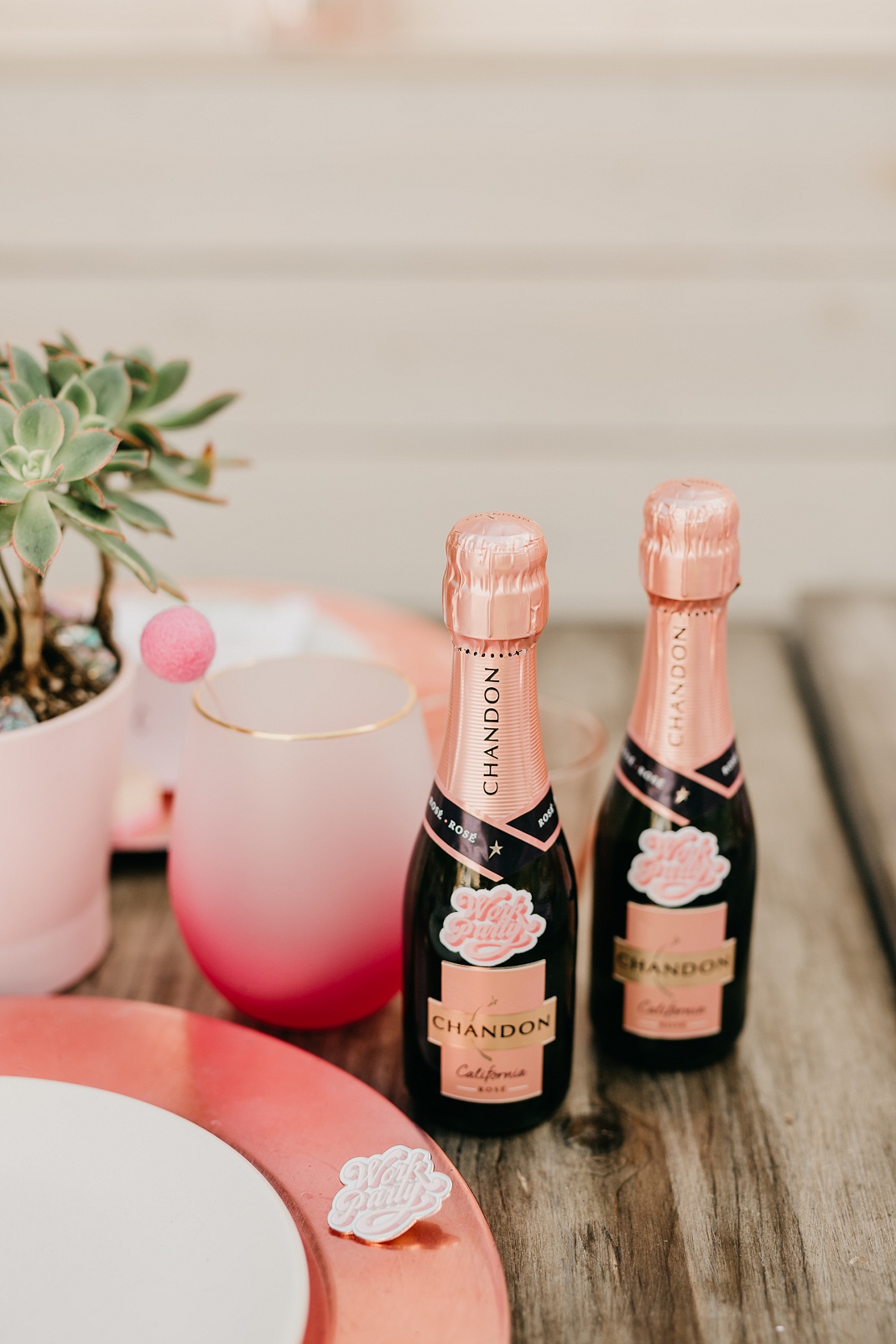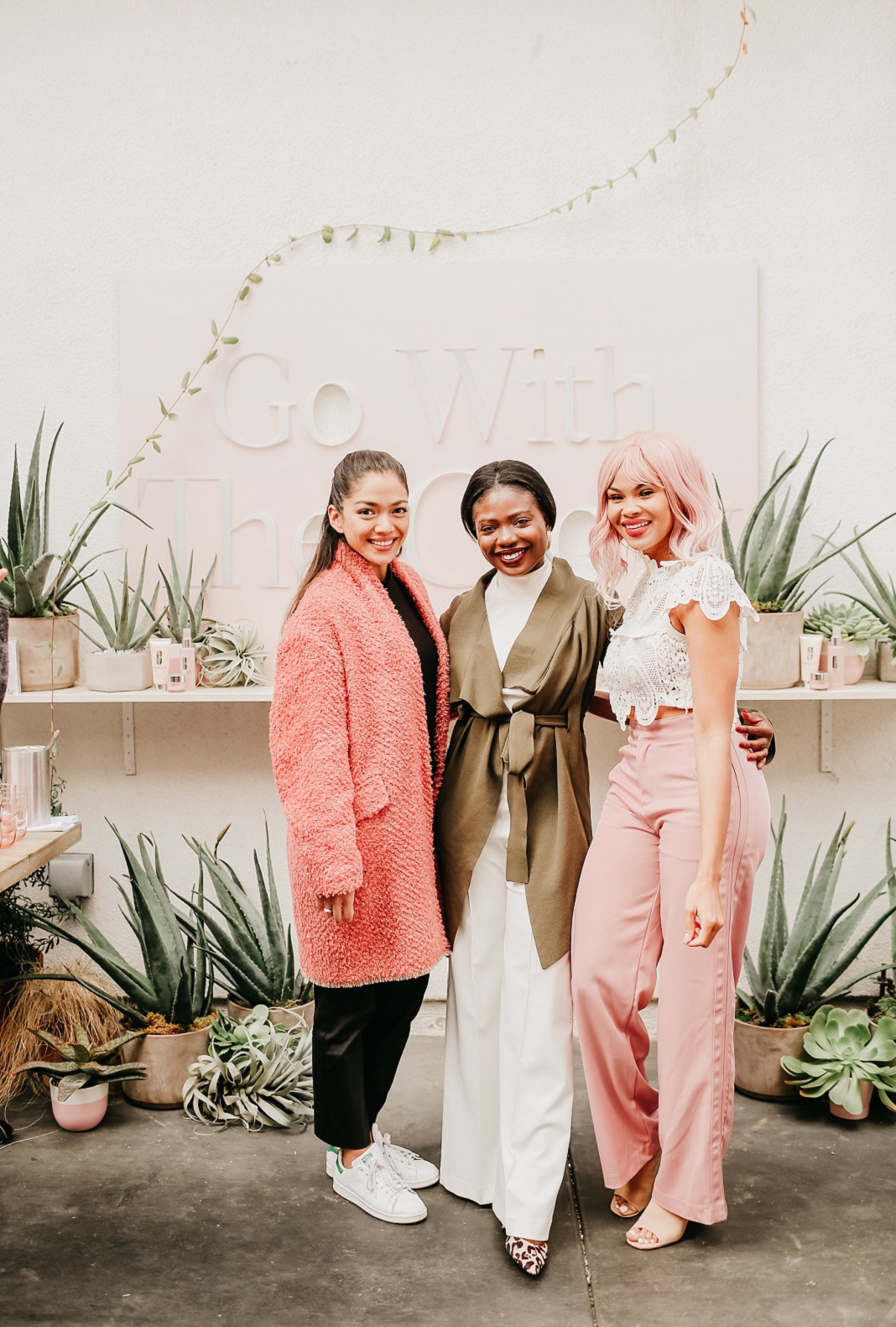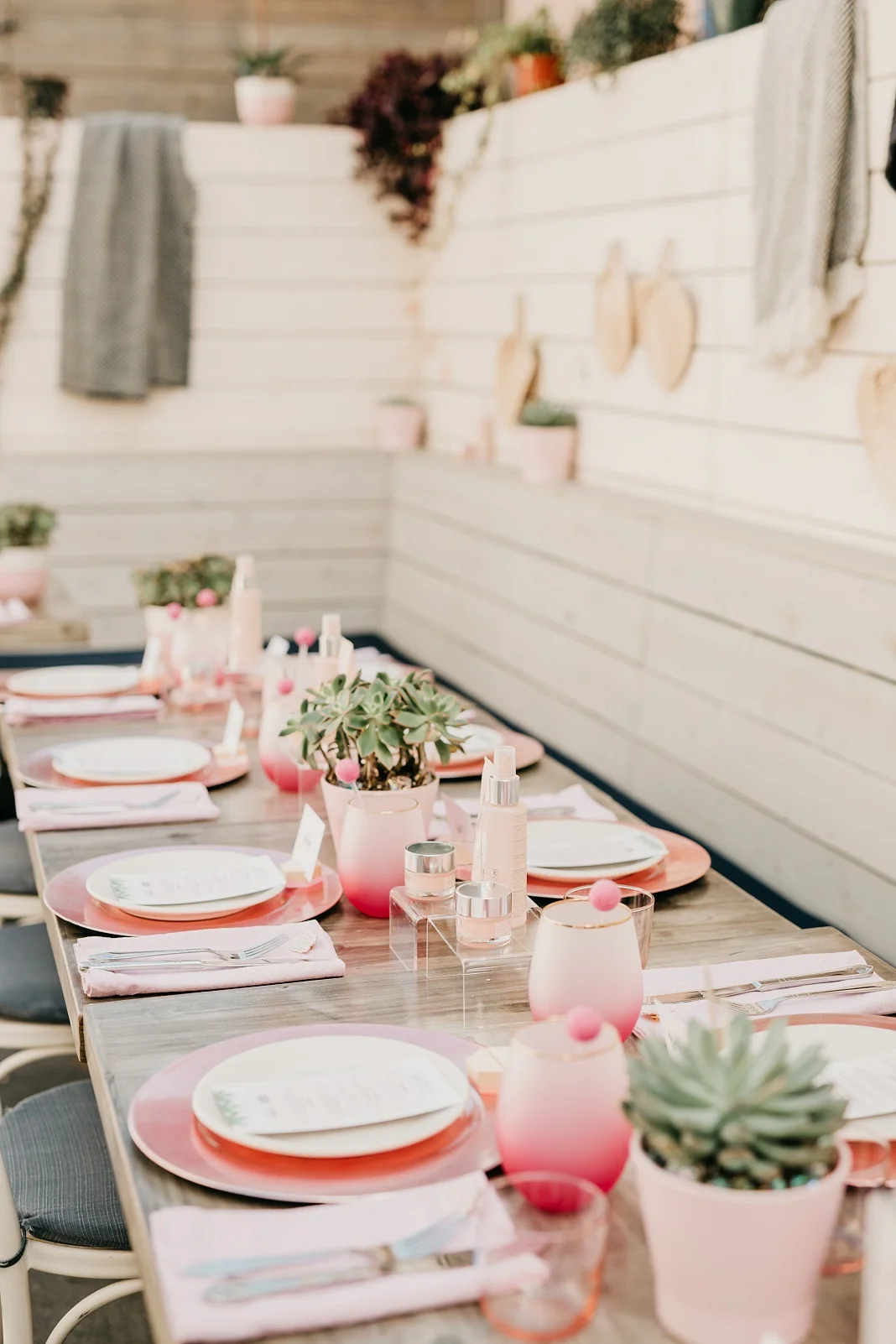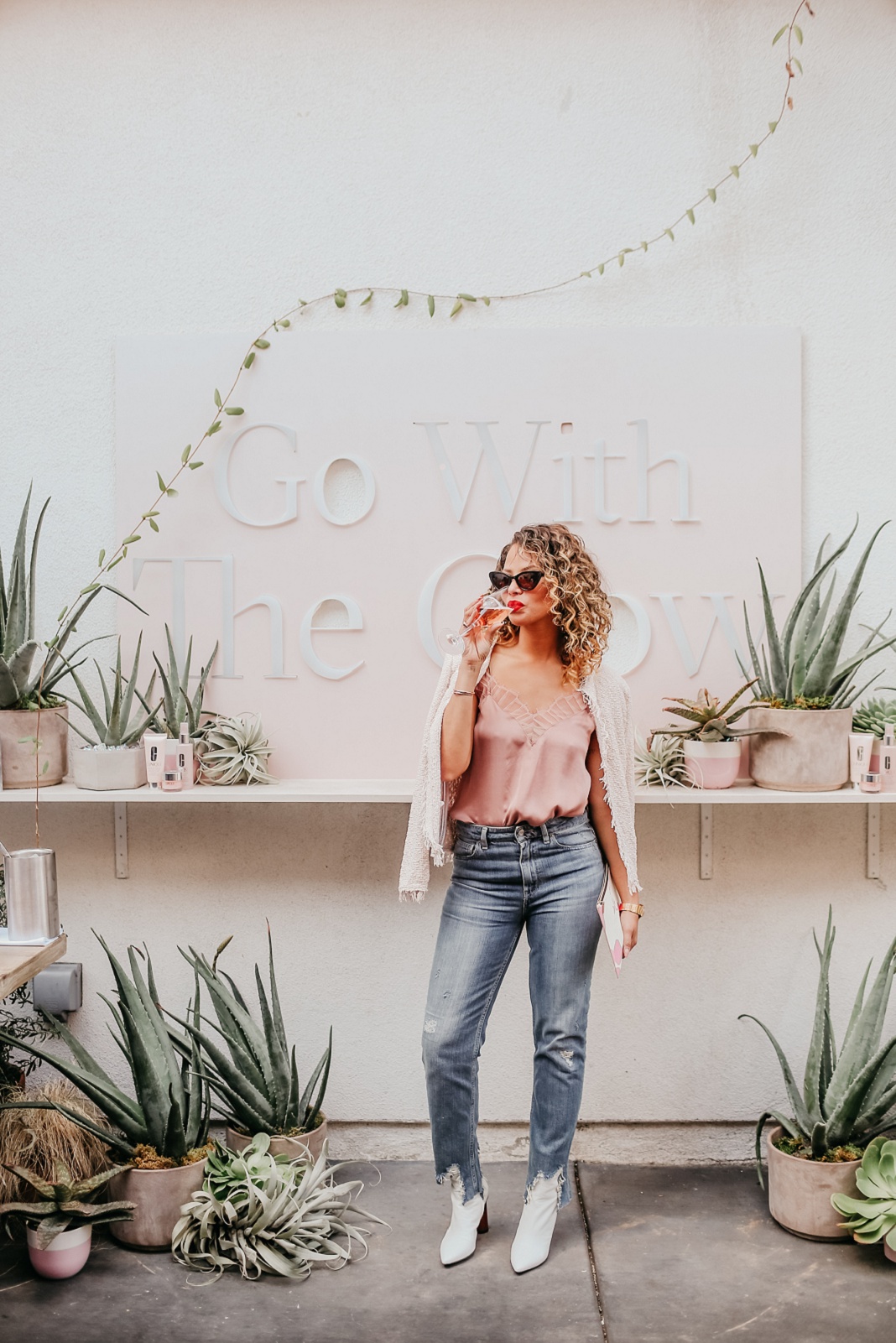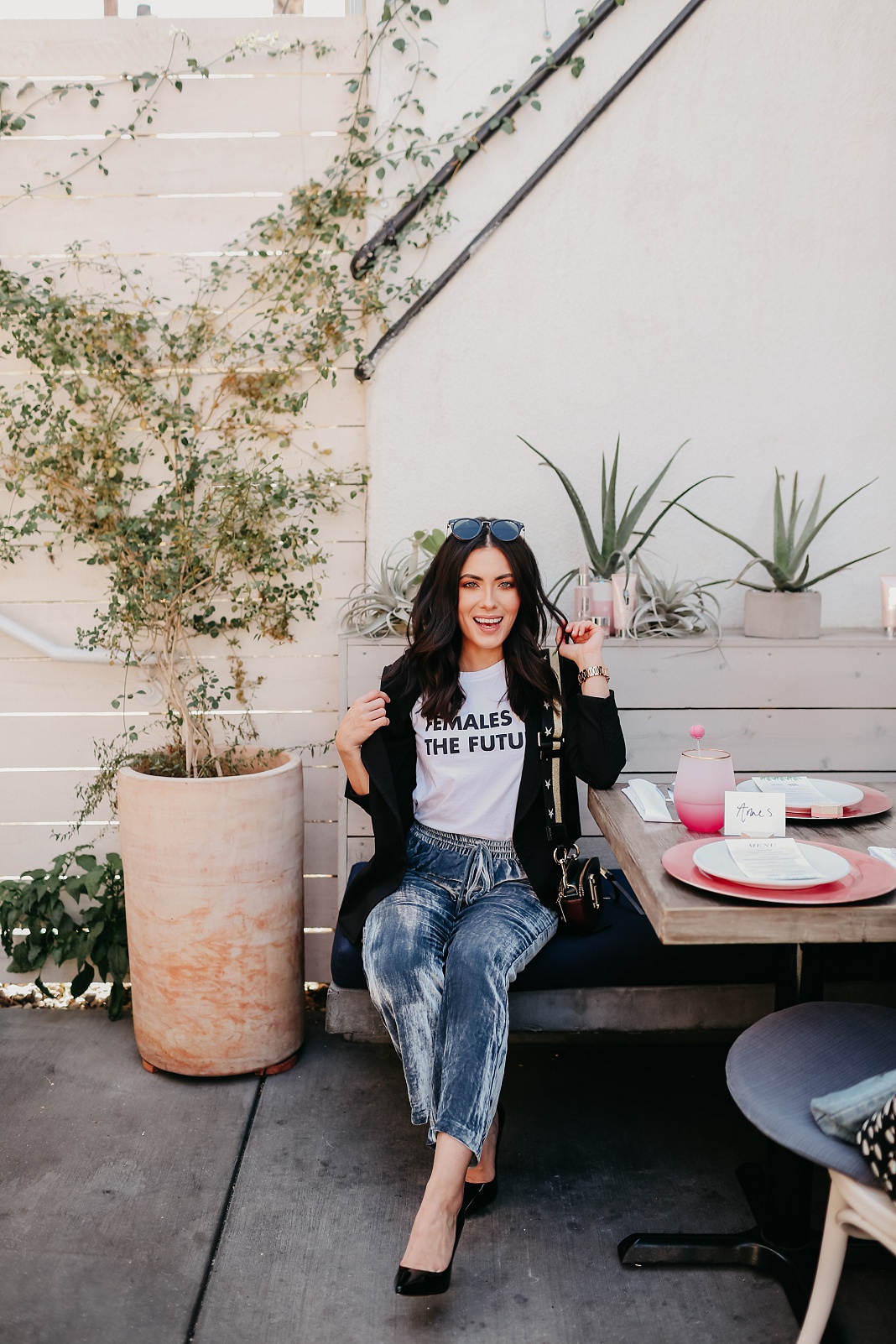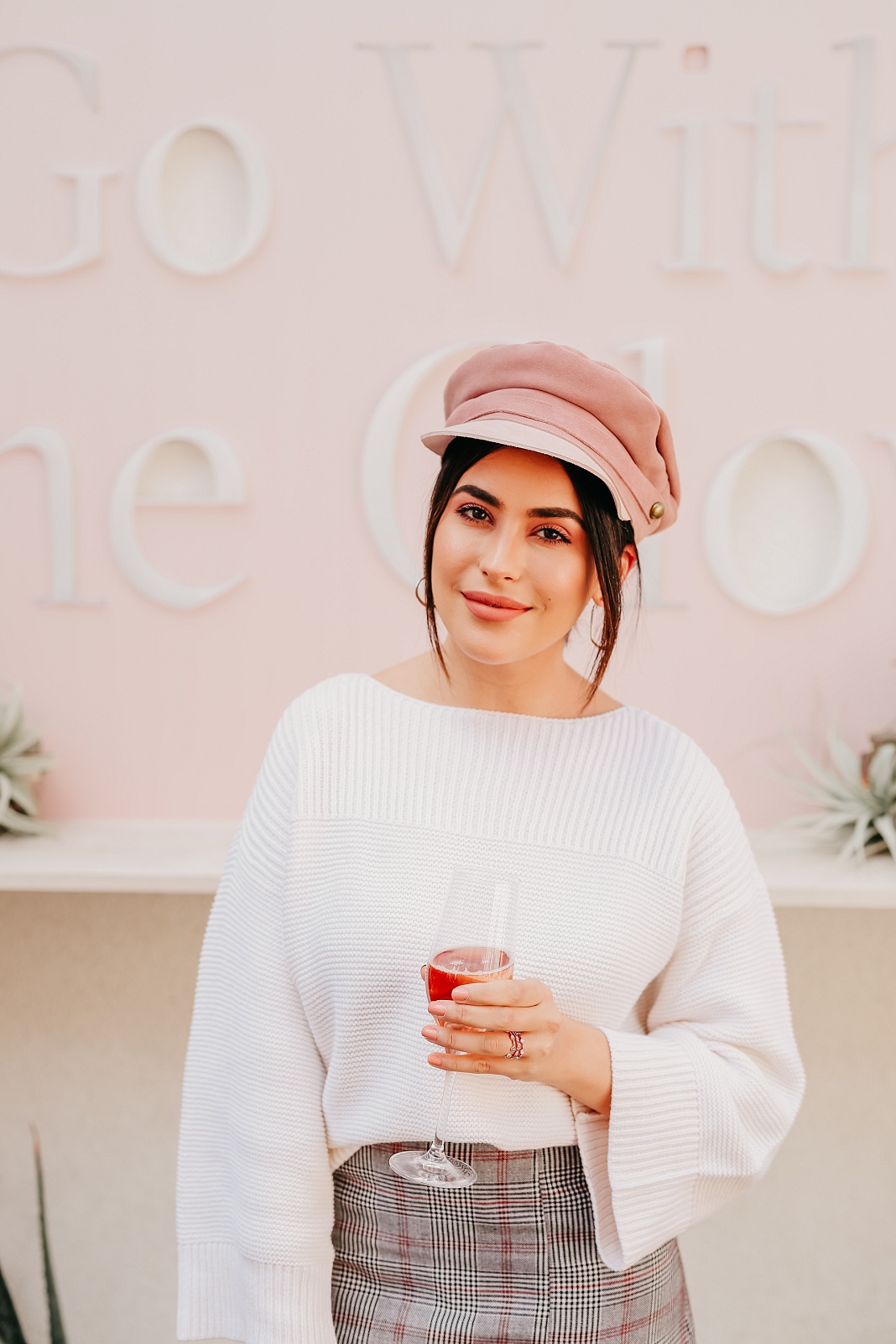This Clean Beauty Entrepreneur Wants You to Break Up With Toxic Ingredients
No scrubs here, just exfoliators.
We know how daunting it can be to start a new business, especially if you’re disrupting an industry or creating an entirely new one. When there is no path to follow, the biggest question is, where do I start? There is so much to do, but before you get ahead of yourself, let’s start at the beginning. To kick-start the process, and ease some of those first-time founder nerves, we’re asking successful entrepreneurs to share their stories in our series, From Scratch. But this isn’t your typical day-in-the-life feature. We’re getting into the nitty-gritty details of launching a business, from writing a business plan (or not) to sourcing manufacturers and how much founders pay themselves—we’re not holding back.
Photo: Courtesy of Yewande Masi
Yewande Masi knows a thing or two about the benefits of cutting toxic things out of your life. After a particularly painful breakup, she launched Ornami Skincare, a clean skincare brand aimed at inspiring others to eliminate toxins from their self-care routine. “I used to make these products for an ex, and when we broke up, I channeled my energy and passion into leveling up and creating them for my girlfriends instead,” explains Masi. Playful references to the breakup are present in the brand’s punny product names, like Let That Mango Body Butter and No Scrubs Ex-Foliator Scrub.
But Ornami Skincare is so much more than a clean skincare brand. “I started it with the idea of creating a self-care community for women,” says Masi. And she’s done just that by creating a group of “Glow Gettas” on social media. Through Ornami Skincare’s Instagram account, Masi is sharing motivation and inspiration for self-care, wellness, and beauty and bringing women together in the spirit of letting go of negativity, toxicity, and anything that doesn’t serve you. It’s a community that’s all about "zero-toxins, zero-drama, and skincare that keeps it one hundred," as the brand’s IG bio promises.
Ahead, the clean beauty entrepreneur tells Create & Cultivate all about how she launched Ornami Skincare to empower women like herself, why community has been key to her success, and her #1 piece of advice for founders starting out today.
Did you write a business plan? If so, was it helpful? If not, what did you use to guide your business instead and why did you take that approach?
When I was getting my MBA, I wrote a business plan for another venture and used that as a template for Ornami Skincare. Having a business plan has been helpful in making sure the business has a roadmap and stays on track, but business plans are living documents so you have to be flexible to bend while maintaining the core of the mission.
How did you come up with the name Ornami Skincare? What was the process like, how did you know it was the right name, and what are some of the things you considered during that process?
I was seeking a name that was unique and spoke to the customer I was looking to connect with. I believe my customers are royalty, but I didn’t want to use “queen,” as the word is used a lot. So, I started thinking about the experience of a queen, or someone luxuriating and being adorned. From there, I researched the term “crown” in different languages to see how it sounded. Finally, I landed upon “Ornami” in the Esperanto language. I especially liked the history behind Esperanto being that it was (is) a language spoken by people living in different countries. It spoke to the experience I was trying to create; an inclusive community of women with different backgrounds and experiences but speaking the same language of self-love and self-care.
What were the immediate things you had to take care of to set up the business?
The first couple of things I did were buy the domain name and build the website. I also set up our business structure (LLC, S-corp, etc.) in-state and obtained our EIN (employer identification number) so we could set up our business checking account to accept payment from orders. I immediately followed up by securing my social media handles. The trademark wasn’t immediate as it was pretty expensive, so for the time being, I use ™ to have rights to the name while we wait for the trademark to be approved.
What research did you do for the brand beforehand and why would you recommend it?
As you know, the skincare industry is a very competitive one. I had to do as much research as I could to see where I could be different. A lot of industry reports were free online and I had access to other research reports by visiting the library and learnings from these resources were used in my business plan. I recommend it. It provides insight into the industry so you have an idea of what you’re walking into and helps you to identify how you can be different from what’s already offered.
How did you find the manufacturers that you work with?
I started making skincare products out of my own personal interest for friends and family, but when I got serious about the business I took educational courses on the right way to formulate and create all-natural skincare products. This background knowledge ended up being really helpful when searching for manufacturers so I could have a better understanding of the business. I am a huge advocate of referrals and leveraging your network to help identify trusted providers. Also, many, if not all, industries usually have trade associations that can provide supplier lists on their websites, so I would suggest combing through these lists to help you get started.
What makes a successful partnership, and what advice can you share for fellow business owners on finding the right partners?
Partnerships have been extremely important for the growth of Ornami. The advice that I would offer fellow business owners to take it slow! Do your research in order to find the right partner for you and your business. Try determining early on if the partner understands your mission; you want the people you're working with to align with yours so they’re able to produce the best version of what you’re looking for. Last but not least, ask for client testimonials. Think about all the research one does for skincare products—reads reviews, looks at customer photos, as their friends and family for their thoughts, etc.—and go through that same process with your potential partners.
Did you self-fund the company? If so, how did you bootstrap it and what was that process like for you?
I have completely self-funded Ornami Skincare. Mostly using savings I earned from my full-time job (which I still have!). At this point, I have not received any outside investments, though it’s not something I’ve ruled out and would likely be open to it if the right opportunity and partnership opened up.
I wasn’t in a rush to get Ornami Skincare up and running because I was funding everything myself. I made small purchases along the way and started out at local pop-up shops to get Ornami Skincare in front of shoppers and as an easy way to connect with the community. Going this route required minimal financial investment other than my time. I would reinvest any money from the purchases back into the business. I also leveraged online freelance services to hire contractors for one-off jobs, which helped to keep my spend low.
Do you pay yourself, and if so, how did you determine what to pay yourself?
Most of the money earned is reinvested back into the business. I have experimented with paying myself a 10% commission after hitting a monthly revenue target. This ensures the business meets projected sales forecasts and takes care of me as an employee.
How big is your team now, and what has the hiring process been like? Did you have any hiring experience before launching your business?
I work with an amazing team of six passionate women who are not just my team members, but who are also invested in Ornami’s success. Many of my team members were referrals. I have experience hiring having previously been a manager at Verizon Wireless. One thing that I’ve learned over the time of being an entrepreneur is that you cannot do it all. Pull in the experts and ask for help when you need it. For example, for a brand like Ornami, which is fostering a community, an authentic Instagram presence is essential—but I really can’t do it all myself. I work with a team that believes in my vision and can help carry it out and make sure that I do the things that really fulfill me, like hosting Instagram Lives to foster the community.
Did you hire an accountant? Who helped you with the financial decisions and setup, and what advice can you share?
The first two professionals I hired for the business were an accountant and lawyer. The lawyer was recommended through a friend from my MBA program. When I searched for an accountant, I was looking for someone who was personable and was qualified to work in different states in case I ever wanted to expand. I received a lot of help from my alma mater and my MBA program with regards to my financial decisions and set up. They helped me to look beyond any short-term decisions and to think about how these decisions would affect the company long-term. I would recommend people to reach out to their alma mater and get in touch with their alumni communities. Many colleges and universities are investing in their grads by connecting them to programs to get support for their businesses.
What has been the biggest learning curve during the process of establishing your business?
Digital marketing has been my biggest learning curve, but what I’ve learned is you don’t have to be an expert at everything, and you especially don’t have to become an expert all in one day. Having an understanding of the fundamentals and learning as you go can still help to keep your business moving forward.
How did you promote your company? How did you get people to know who you are and create buzz?
Ornami Skincare is more than a business or a skincare company. I started it with the idea of creating a self-care community for women, and I always keep that in mind when I’m thinking about how to reach our audience. So, for example, I started Ornami after a breakup. I used to make these products for an ex, and when we broke up, I channeled my energy and passion into leveling up and creating them for my girlfriends instead. Being honest about that story has really resonated with and empowered the women in Ornami’s community, and helped to provide a story behind the brand to really capture people’s attention.
Similarly, I have a lot of fun with our products. The names, like “Glo Getta” and “Let That Mango,” have really helped set us apart from traditional skincare products and have created a bit of buzz around who we are and what we do. It’s all about being memorable. We’ve built a loyal following by being active on Instagram and being creative in the ways people can share the love. For example, we did a #letitglow campaign in the new year that encouraged people to tell us what they were going to let go of in 2021. It’s on-brand for us, but it also generated a bit of social buzz. We even have a special edition of “Let That Mango” packaging that’s labeled, “Let that ____ Go” and comes with a Sharpie so people can fill in their word and make it a daily affirmation.
It’s all about being creative and authentic, and I’ve found that doing those two things have moved the needle for me in terms of brand awareness.
Do you have a business coach or mentor? How has this person helped, and would you recommend having one to other entrepreneurs?
I have a few mentors and I definitely would recommend having one. Even if you aren’t an entrepreneur, I think it is important to have mentors for your own personal growth and development. My mentors have been so helpful. They provide different perspectives, give advice and connect me with people in their network. I found my mentors by being connected to entrepreneurial communities and asking if they would like to be my mentors.
How has COVID-19 impacted your business operations and financials? What tactics and strategies have you put in place to pivot and ensure your business is successful through this period?
I launched my first product in April 2020, so we have been operating in this space the entire time. I do think people have become increasingly focused on supporting small business owners and Black-owned businesses during the past year, and that’s helped to get Ornami some additional attention where we might otherwise have been competing with huge national brands for it. Since we’re so new, I don’t have a “before” to compare things to. Of course, if we were in “normal” times there would be a lot of opportunity for face-to-face events, sampling, and that type of thing. The pandemic has forced us to get very creative with making people understand what we are about without being able to experience it in person.
What advice can you share for small business owners, founders, and entrepreneurs who are also reeling in response to COVID-19?
COVID has been a tremendous challenge for businesses of all sizes, but having founded the company during the crisis, I also think that there are silver linings for business owners. I’ve noticed that people are more conscious consumers over the past year, so if you’re a small business owner or creating a product that’s sustainable, non-toxic, or socially responsible, I think there is a lot of opportunity to make noise now that maybe wasn’t there before.
Also, people have really become accustomed to convenience and e-commerce, so leaning into that is a great idea. We sell online only on our Ornami website and that’s been a blessing over the past year as we are where consumers want us to be.
COVID has also made it easy for people to become isolated, even unintentionally. Try to surround yourself with other entrepreneurs you trust to provide feedback, perspective, and general support. Sometimes it can be helpful to talk to someone who understands what you are going through.
What is one thing you didn’t do during the setup process that ended up being crucial to the business and would advise others to do asap?
Set up reminders to file your state’s annual business reports to prevent any potential issues in the future. Some state timelines are different from the general fiscal year so it’s important that you put these in your calendar. I would also add to make sure you understand all of the documents and timelines needed for government filings.
For those who haven’t started a business (or are about to), what advice do you have?
Create a community! It’s so important to have the support of others as you start up. Find other entrepreneurs who are at the same stage you are to commiserate with and mentors to learn from. Make connections with people in other parts of the business who can give you advice and who you can provide value to as well. Be authentic and make it a two-way street and you will find that you can foster a great community that will help you along the way.
What is your number one piece of financial advice for any new entrepreneur and why?
Create a budget early on for how much you plan to spend on the business. Have someone in place to report to who will hold you accountable. Without spending controls in place, things can gradually pile up.
If you could go back to the beginning with the knowledge you have now, what advice would you give yourself and why?
I would emphasize to myself how important establishing the right mindset is to growing a business. As often as possible, to nurture myself with healthy positivity and eliminate fear. I would also “make the asks” more often for things I needed to push myself and the business forward. It was surprising how many people were ready to say yes and support once I began to ask, that I wish I started asking sooner.
Photo: Courtesy of Ornami Skincare
MORE ON THE BLOG
Why This Beauty Entrepreneur Believes Failing Fast Is Better Than Avoiding Risk Altogether
She rose to the occasion and launched her first product in the midst of the pandemic.
We know how daunting it can be to start a new business, especially if you’re disrupting an industry or creating an entirely new one. When there is no path to follow, the biggest question is, where do I start? There is so much to do, but before you get ahead of yourself, let’s start at the beginning. To kick-start the process, and ease some of those first-time founder nerves, we’re asking successful entrepreneurs to share their stories in our series, From Scratch. But this isn’t your typical day-in-the-life feature. We’re getting into the nitty-gritty details of launching a business, from writing a business plan (or not) to sourcing manufacturers and how much founders pay themselves—we’re not holding back.
Photo: Courtesy of Vie Beauty
When Atlanta-based esthetician Jasmine Lewis first opened the doors to her salon, Vie Beauty, she didn’t have any intention of pursuing a long-term career in beauty. After graduating from Clemson University with a degree in biological sciences, she enrolled in esthetician school and started her salon as a side-hustle to save money for medical school. However, as she worked toward her esthetician’s license, she discovered the deeper connections between biology and beauty and found that it was possible to pursue both of her passions at the same time. So she pivoted.
Then, last year in the midst of the coronavirus pandemic and COVID-induced shutdowns that impacted her small business, Lewis pivoted yet again and launched Vie Beauty’s first product, 30Roses Hydrating Rose Water. “I had developed my own rose water spray to use on clients and kept receiving requests to purchase the spray—that was my ‘aha moment,’” she told Create & Cultivate. “I had every intention of scaling my business, and the rose water spray seemed like the perfect place to start.” And the pandemic presented the perfect opportunity for her to take the plunge.
Below, the up-and-coming beauty entrepreneur spills all the details behind how she built her blooming business, including why she believes it’s always better to fail fast and learn from your mistakes than avoid taking risks altogether.
Take us back to the beginning—what was the lightbulb moment for your business?
Like many people, I was stuck in a job that wasn’t the right fit for me. My family and I were in the midst of a traumatic experience, and my job at the time would not allow me to travel home to be with them. At that moment, I realized I needed to pursue something different, something I was truly passionate about and could create on my own.
I have owned my beauty studio for several years serving clients as an esthetician, and rose water has become an essential part of my services. I start each appointment by cleansing the client’s face and then applying rose water to hydrate the skin. I had developed my own rose water spray to use on clients and kept receiving requests to purchase the spray—that was my “aha moment.” I had every intention of scaling my business, and the rose water spray seemed like the perfect place to start. And thus the 30Roses Hydrating Rose Water was born.
Did you write a business plan? If so, was it helpful? If not, what did you use instead, and why did you take that approach?
I had a very loose business plan when I started my beauty salon. The salon started more as a “side hustle” to save money for my then-goal of medical school, and it transitioned into something greater.
But this year, prior to the launch of the 30Roses spray, I spent more time creating a structured business plan. I created an outline of my business goals with a timeline because I needed a road map to see where I was going and the different milestones that I wanted to hit in that time frame.
How did you come up with the name? What was the process like and how did you know VieBeauty was the right name? What are some of the things you considered during that process, and what advice can you share?
Vie means “to be alive” in French. I believe in choosing life in every aspect of the choices you make, to be alive and fulfilled in all things that bring you joy. The skin is the largest organ of our bodies and seemingly is what keeps us alive. This is why skin health, proper skin education, and being mindful of the ingredients we put on our skin is so vital to living. Also:
The VI in Vie Beauty is the Roman numeral for 6, which represents the month that both of my grandmothers passed away.
Our pink logo is inspired by breast cancer awareness, as one of my grandmothers passed away from breast cancer.
I knew Vie Beauty was the right name for my brand because it represented everything I stood for and my “why.” My grandmothers were my whole world, and they are now at the core of my brand. I played around with name ideas that incorporated my name, but it just did not resonate with me. Vie really stuck with me and I felt like it would stand against the test of time. I could picture Vie Beauty as a global brand that could expand into something much more. When thinking of a company name, my advice would be to think long term; think of your 10-year goals for your brand instead of focusing on the now.
When deciding on my business name, I took into consideration whether or not the name was taken, the accessibility of the name, how easy it was to spell and search, if there were any other brands working under the same name, how it looked on paper, how easy it would be for others to remember, and the way the name sounded. Be sure to check for trademarks and search social media to make sure no one is operating under the name you want. Make the name unique to you and your story as well as the mission you want to achieve. But make sure it’s not too difficult to remember, spell or pronounce; you want your business to be very easy for customers to remember.
What were the immediate things you had to take care of to set up the business and what would you recommend to new founders reading this right now?
The items at the top of my list were an Employee Identification Number (EIN), LLC filing, a Google listing, my website domain, and my social media handles across all platforms (even ones that I might not have used initially, just for name security purposes). These are all crucial to secure as a founder of a new business.
I also recommend securing the variations to your domain name (i.e. .org, .co, etc.), your trademark, and any other names that you feel you would like to associate with your brand. It’s an extra layer of security for your business.
What research did you do for the brand beforehand? Can you explain how you found and compiled that research? Why would you recommend it and why is it important?
I started by researching my competitors as well as brands I admired that were doing well and creating some sort of impact in the industry. I didn’t just stick to the beauty industry with my research; I looked at brand strategies in other avenues such as tech to see what made them successful. I religiously read and researched trends and created specific verticals in my research regarding my target audience. I primarily used the internet (aka Dr. Google), my network of supporters, books, and podcasts like “How I Built This” by Guy Raz and “Side Hustle Pro” by Nicaila Matthews Okome. I also used platforms like Pinterest to create mood boards for things I liked and didn’t like as I built the brand. And prior to launching the 30Roses rose water, I got feedback on the product through a series of collaborative pop-ups to test the market. Researching is crucial because it can answer questions that you didn’t even realize you needed to know.
How did you find the manufacturer/production facility that you use? Did you have any bad experiences? What did you learn, and what advice do you have for other founders looking for a trustworthy manufacturer?
I thoroughly researched manufacturers online (aka Dr. Google) and found my current manufacturer through extensive research. I actually had a bad experience with the first manufacturer I used, as they took an extremely long time to develop the product and it still wasn’t up to the quality standards that my customers deserve. Overall, I learned to ask more questions during the vetting process. Get clarity on the scope of work and make sure EVERYTHING is in writing; contracts are essential for every working relationship you have. Get plenty of references, request samples, test and research, research, research before selecting a manufacturer.
Did you self-fund the company? If so, how did you bootstrap it? Did you do a friends-and-family round? Or did you raise seed money or initial investment money? What path would you recommend?
Vie Beauty was completely self-funded—it was primarily bootstrapped through savings, the profits from my beauty studio, and family gifts. The funding route you should choose depends on the rate that you’d like to grow your business. If you are trying to grow quickly, you should aim to raise money and secure investors. But if you are willing to move at a slower, steady pace, it is completely fine to go the bootstrap route. Keep in mind that when you bring on investors, you also lose part ownership of your business; you are no longer the sole owner. On the other hand, investors often provide mentorship and guidance as you grow the business. So it all depends on your goals.
How much did you pay yourself in the beginning?
Like many new entrepreneurs, I actually do not pay myself. I reinvest everything back into the business and paying my team.
How big is your team now, and what has the hiring process been like? Did you have hiring experience before this? If not, how did you learn and what have you learned about it along the way? What advice can you share?
I have an extremely small but mighty team. I do work with contractors for some aspects of the business, but the blood, sweat, and tears are all me (although, my husband does step in from time to time). I had a little hiring experience from previous jobs, but my advice is to thoroughly vet the people you want to work with and make sure they align with your values and goals.
Did you hire an accountant? Who helped you with the financial decisions and set up?
I do work with a CPA, but I make my own financial decisions. I recommend working with a CPA to get guidance on the financial aspects of your business, especially for tax purposes. There are a few websites that provide amazing advice on accounting and bookkeeping, like Bench. You can also find people on Fiverr that will help get your books in order or work on an on-going contract basis.
What has been the biggest learning curve during the process of establishing a business? What mistakes have you made?
The biggest learning curve for me was planning ahead and developing an overall strategy. I did not plan for the extreme level of growth that Vie Beauty has had, and at times, I shelled out more money than I should have. For example, I’ve had to pay almost four times the cost of shipping to get something rushed over from my manufacturer or even paying for rush jobs if I had planned ahead, I would not have had to face that type of situation. Having a plan in place is better than trying to wing everything on the spot. Always plan for the best-case scenario and the worst-case scenario.
Also, don’t be afraid to ask questions and ask for help. Oftentimes, your network is more than happy to help you and provide the answers you’re looking for. I still struggle with asking for help, so a lot of times, I am not maximizing my time to its full potential. Also, you need to accept that you’re not an expert in everything and learn to be okay with that. Operating in your zone of genius allows you to perform at your highest power. I tried to build my own website on numerous occasions and it was terrible every time. I believe in hiring experts who can fill in those gaps for you. After hiring a professional to design my website, I saw major growth within my brand and also my social presence. So now I am more confident in showing up.
Do you have a business coach or mentor? How has this person helped, and would you recommend one?
Yes, I do have a few business mentors and I definitely recommend having one or two: one in your industry and another in a different one. Business strategies are pretty similar across industries, they are just applied in different ways. For example, the art of maximizing human attention can be applied to any industry across the board that has a social presence. Oftentimes, you can find mentors in your close network that are willing to give you solid business guidance. Look to the people you already know when starting the search for a business mentor.
How did you promote your company? How did you get people to know who you are and create buzz? What challenges have you faced?
Social media and referrals have been my biggest marketing tools. I actually learned a lot of marketing strategies when running my beauty studio, so I already knew quite a bit about how to promote Vie Beauty prior to launching. About 30% of my business’s income comes from marketing efforts. The biggest challenge so far has been Facebook ads; I wasn’t very well versed in Facebook advertising or creating a paid social strategy. Thankfully, I have experts on my team to assist me. Resources like Create & Cultivate have also been very beneficial as I navigate the marketing process.
What is one thing you didn’t do in the setup process, that ended up being crucial to the business and would advise others to do asap?
The most important thing I could’ve done was getting a trademark and patent. I am in the process of securing those right now, but I wish I had done it prior to launching because it can take a long time to get approval.
For those who haven’t started a business (or are about to), what advice do you have?
Come out strong and don’t cut any corners. You might be hindering yourself from success by not initially presenting the best product possible. Take risks and don’t be afraid to fail. It’s always better to fail fast and learn from it than to avoid risks altogether. Always aim to be better than you were yesterday, and stay laser-focused on your goals, plans, and brand mission.
What is your number one piece of financial advice for any new business owner and why?
My biggest piece of advice is to secure capital. You have GOT to spend money to make money, so consider your funding options before launching your business.
If you could go back to the beginning with the knowledge you have now, what advice would you give yourself and why?
If I could go back to the start, I would tell myself to create a solid plan and strategy, don’t cut any corners, and start out strong! Also, be patient with yourself and your process. Your journey is not like anyone else’s journey. Use grace as you learn to navigate the entrepreneurial space and always speak life and bounty over your business.
MORE ON THE BLOG
From Scratch: How This Founder Turned the Gut Health Trend Into a Best-Selling Beauty Brand
It’s an inside job.
We know how daunting it can be to start a new business, especially if you’re disrupting an industry or creating an entirely new one. When there is no path to follow, the biggest question is, where do I start? There is so much to do but before you get ahead of yourself, let’s start at the beginning. To kickstart the process (and ease some of those first-time founder nerves) we’re asking successful entrepreneurs to share their story in our new series, From Scratch. But this isn’t your typical day in the life. We’re getting down to the nitty gritty from writing a business plan (or not) to sourcing manufacturers and how much they pay themselves, we’re not holding back. If you want to know how to start a business, you’ve come to the right place.
Of all the interviews we’ve conducted at Create & Cultivate, one of the main messages we hear from successful founders is find a need, figure out the white space, and turn it into a business. But here’s the thing, finding your niche or that untapped market can be tricky: You could list all of your interests and passions and still come away feeling as if you haven't hit upon the singular thing you were meant to do.
When you do find it, you’re often faced with anxiety-inducing panic because you now realize you have to execute it and if you don’t move fast enough, someone could copy it! But the question is—is it better to get up and running and be the first to market, or wait around and do it right?
For Carla Oates, it was always about doing it right. Her entrance into the startup world was ignited by her desire to see change. During her time as a beauty editor, Oates felt frustrated by the industry’s lack of transparency about the potentially harmful effects of their products and couldn’t stand idly by while people used ineffective chemicals to treat their skin. This is how she came to start The Beauty Chef, a company revolving around the concept that “beauty begins in the belly.”
Oates is no stranger to struggles with health and skincare. Dealing with eczema and allergies since childhood, she learned from an early age the strong connection between one’s mind and body. Oates is a firm believer that taking a holistic approach to skincare and wellness will make your skin brighter and healthier than any cosmetic product could achieve.
We had the pleasure of sitting down with Oates to share her journey from blogger and stylist to beauty guru and author of best-seller Feeding Your Skin, The Beauty Chef Gut Guide, and The Beauty Chef recipe book.
Did you write a business plan?
“When I first started out I didn’t have a business plan. I had no idea about the business. I had created the product now known as GLOW™ Inner Beauty Powder and developed a simple website where customers could purchase the product online. From there the business grew very organically, and it wasn’t until the third year when I saw a substantial increase in demand across various different retail channels that I felt it necessary to create a strategy and business plan to support the additional growth.”
How did you come up with the name? What was the process like?
“In 2009, when I brought my first product, GLOW™ Inner Beauty Powder to market, the business was actually called Carla Oates Beauty. At the time I was also giving a lot of talks at various organic and beauty expos around how to make natural recipes for skin health using raw ingredients. I’d been deliberating on whether I wanted my name to be the brand name or to keep it separate. Around this time I started titling my talks—as well as my regular column in Australia’s Sunday Telegraph—as The Beauty Chef.
“As the business grew it made more and more sense to streamline my talks, the brand, and the products to this name. My very first product that launched in 2009 was called Carla Oates Beauty Inner Beauty Powder and in 2012 I decided to change the name of the brand to The Beauty Chef as I felt it was a strong, more cohesive representation of what I was doing. This decision also helped in separating me from my brand—our mission to help people be the healthiest, happiest versions of themselves has always been bigger than one person.”
What were the immediate things you had to take care of to set up the business?
“All of the above! Website domain, business name, and trademark. Setting up our socials didn’t come until a little later.”
“I knew looking after your skin properly was an inside out job.”
What research did you do for the brand beforehand? Why would you recommend it?
“Research came in the form of my personal journey to creating The Beauty Chef, which really stems from my own skin and gut health issues and that of my family’s. As a child, I suffered from eczema and allergies and my mum took me to see a naturopath who dramatically changed what I ate, removing processed foods as well as allergens such as gluten and dairy from my diet. My allergies and eczema subsided, so I experienced firsthand the connection of food as medicine—that what we eat can affect our skin and health.
“As a journalist in my early career, I landed a job as a beauty editor for a mainstream newspaper and was inundated with lots of beauty products from mass-market brands. My excitement soon dissipated, after researching the ingredients and becoming increasingly concerned about the many toxic chemicals in skincare products. Women from all over Australia were writing into my column asking for advice on what products to use for their eczema, psoriasis, acne and other chronic skin issues. I knew looking after your skin properly was an inside out job from my own experience with eczema, and knew that none of these chemical-laden products would actually help, heal or regenerate their skin.
“I decided to make it my mission to help change the paradigm in the beauty industry and help educate women on how to look after their skin in a healthier and more holistic way. So I left the newspaper, wrote a book with Penguin books in 2004 called Feeding Your Skin and became the natural beauty writer for Wellbeing magazine, who I still write for today. I also penned a natural beauty column called DIY Beauty for the Sunday Telegraph newspaper for eight years, and during that time wrote hundreds of articles on natural health and beauty. I was the ambassador for organic skincare for the Biological Farmers of Australia for nearly two decades and am currently an ambassador for Australian Organic.
“Interestingly, when my daughter also experienced eczema and allergies, around 12 years ago, when she was about ten, I eliminated trigger foods like dairy and gluten from her diet, but I also started researching the link between gut health and skin health and found some of the studies very interesting. As I explored this link more closely, I decided to put my family on a gut-healing protocol which included eliminating certain foods from our diet but also introducing lots of Lacto-fermented wholefoods teeming with beneficial bacteria aka probiotics into our diet. These included foods like sauerkraut, kefir, and kimchi. As I began to experiment in my kitchen at home, Lacto-fermenting a variety of whole foods, I realized I was onto something.
“Friends and family also took notice, asking what I was doing differently as my skin was glowing and I quickly became the local beauty pusher and supplier of these fermented foods as they became in high demand from everyone from neighbors, friends, and family. They found they had better energy, happier tummies, and healthier, more radiant skin. From here in 2009, the first iteration of GLOW™ Inner Beauty Powder was born, my first inner beauty product containing 24 bio-fermented superfoods with prebiotics and probiotics for gut health, glowing skin, and wellbeing.”
How did you find the manufacturer/production facility that you use? Did you have any bad experiences? What did you learn?
“Like a true journalist, I found our manufacturer through research. I did have some interesting experiences, to begin with as I was just starting out. The orders and quantities I was placing were modest and not in line with their usual requirements for minimum runs so I had to convince them and gain their buy-in that the business would grow. A key piece of advice I would pass on to anyone starting out is to ensure you have all correspondence in email so that there’s a record of the conversations. Also, be very clear about what you will and will not accept in your products.
“The processes and ingredients must be compliant with your brand philosophy; it’s important to be persistent, strong and dogged with your manufacturer from the onset as you don’t have the buying power and protection of bigger brands. Ensure that you obtain a solid, rigorous supply agreement from them early on to guarantee best practice is maintained between both parties.”
““I began the company with a few thousand dollars.””
Did you self-fund the company? Did you raise seed money or initial investment money? Why/Why not?
“The Beauty Chef products came from a genuine need rather than the approach of setting out to start a business, so I began the company with a few thousand dollars—$5000 to be exact. My first big break in a commercial sense came when I was approached by an agent at TVSN, the TV home shopping network here in Australia to sell GLOW™. In order to facilitate this opportunity, I funded the first run of products myself. GLOW™ was received very positively, meaning I needed more money to up the quantities that were being produced, so my sister and a best friend invested in the business and are still shareholders. To this day, GLOW™ is the number one seller in TVSN’s health category—and the continued success helped inject capital into my business.
“My biggest piece of advice to those starting out would be to do as much as you can yourself and remember that debt is always cheaper than giving away equity in your business. For me, keeping control of the brand in order to execute the vision without it being diluted has been paramount. That said, it really depends on the individual brand. Variables like growth and capital requirements can be important for attracting investors from a strategic and funding perspective, but it must be the right person(s) who can further amplify your growth and share the vision. The right partnerships are very important—PR, manufacturing, investors, etc.”
How much did you pay yourself? How did you know what to pay yourself? (You don’t have to give the $ value, just the percentage)
“Nothing for the first year. Following that, I paid myself $600 AUD a week for another year, and it went up incrementally from there. I supplemented this income by doing writing work for magazines.”
How big is your team now? What has the hiring process like?
“We now have 30 full-time staff at our head office in Sydney, Australia. Up until about two years ago when I brought on an external HR company, I did it all myself. I had no experience but knew I needed to find the right people with the right skillset. Do not compromise to fill a headcount. Be sure to follow your gut and to ensure that the person is the right cultural fit for the company. It also helps if the person has an interest in the brand mission, as their passion will run deeper if they have that personal interest that pulls them towards the product and philosophy.”
Did you hire an accountant? Who helped you with the financial decisions and set up?
“Yes. I hired an external accountant to help with taxes but I made all the financial decisions to begin with, which was a huge learning curve. I hired my first in-house account two years ago which helped alleviate the pressure from me enormously. One of the most important things I’ve learned when you start a business is to find a good accountant. In my experience, this is not easy. It is really important to understand the finances of your company and have a good understanding of taxes, tax concessions, grants, etc. So even if you are not all over the small details, you can pick up if something doesn’t look right. My advice is to ask questions! Continue learning and use your common sense. I ran a lean ship at the beginning, and kept overheads really, really low checking on cash flow and production flow charts each week and often on a daily basis.”
“Do not compromise to fill a headcount. Be sure to follow your gut and to ensure that the person is the right cultural fit for the company.”
“Look after your gut, be gutsy and follow your gut instinct!”
How did you promote your company? How did you get people to know who you are and create buzz?
“I had worked as a fashion stylist and beauty editor for several years so I had exposure to PR and marketing but no direct experience. I remember when I first launched GLOW™, beauty editors, while being baffled, were also intrigued, so it received a lot of attention from the media. As a result of a piece written on the product in Vogue Australia, the buyer from the Farmers department store in New Zealand called me and said that she had seen a story on the product in a magazine and bought it from my website. She was amazed by the results and said she would love to stock it but there was nowhere to put it on the shelves—no category for it, and that it was way too ahead of its time.
“As you can imagine, pioneering a category means you need big marketing spend to educate people about a new concept. So with very limited marketing spend, and no awareness of the category, how was I to market this new product and concept? With no shelves to put it on?
“You can’t ever underestimate the power of word of mouth! Our product worked—and people talked about it— they told their neighbors who told their aunts, their work colleagues, their cousins. And then once TVSN caught wind of it and asked me to sell it on live television this gave me national reach and a fantastic platform to educate the customer about the concept and it resonated with them.”
What is one thing you didn’t do in the setup process, that ended up being crucial to the business and would advise others to do ASAP?
“Not creating a business plan from the outset and not having a deeper understanding of margins and profitability. I had picked the most expensive raw ingredients and chosen a fermentation process that takes 6-8 weeks. Neither of these things is commercially viable yet ultimately has set the brand apart. Funnily we haven’t been able to partner with a distributor as our products cost so much to manufacture however it has worked in our favor, as The Beauty Chef has become known for quality and efficacy and I wouldn’t have it any other way.”
For those who haven’t started a business (or are about to) what advice do you have?
“Look after your gut, be gutsy and follow your gut instinct!”
Shop some of our The Beauty Chef favorites:
Collagen Inner Beauty Boost
$50
Body Inner Beauty Powder
$70
Well Spray Inner Beauty Support
$29
Welcome to Your New No Compromise Beauty™ Routine
You’re gonna want to refer a friend.
Over the course of our lives, we make a ton of compromises. Salad for pizza. Ten more minutes of snoozing for… well, totally rushed mornings and dry shampoo.
But where we’ve stopped compromising is on our careers. So why would we compromise on our beauty routine? What we put on our face, is just as important as what we put in our bodies. And ladies, do we have something for your face that will not only help you face the day, but will keep those long midnight-burning hours off your face.
Seriously.
Enter No Compromise Beauty™ from Biossance. For busy working women, Biossance is changing the way women think about their skincare.
And because we know you aren’t always getting the most sleep (or skipping that 4pm jolt of java), sometimes you need more than a caffeine boost to fight the effects of tired looking skin.
NO RETINOL, NO PROBLEM
We’ve heard a lot about retinol in the last couple of years-- or ever since we started noticing those finer lines on our face. However, for many, retinol can cause serious skin irritation-- which, is exactly what you want to avoid when you’re trying to get your glow on.
For anyone who wants the benefits of retinol, but without the irritation or sun sensitivity, the Biossance Squalane + Phyto-Retinol Serum is one of the best examples of No Compromise Beauty™. It offers incredible results without the side effects associated with traditional retinol products and can effectively treat lines, wrinkles, discoloration or sun damage.
CAN BE USED ANY TIME OF DAY
Retinol isn’t what you’d consider an “any time of day” product. It’s normally only used at night after you’ve washed your face.
However, we know how hard it is to remember that night time routine. (We also fall asleep with all the lights on.) The amazing benefit of Biossance’s Squalane + Phyto-Retinol Serum is that is can be used at any point during the day. And it doesn’t cause sun sensitivity. That means if you flub your nighttime your routine, you get a second chance in the AM.
SURE, YOU’RE BRIGHT
But are you being bright about your skincare routine? The smartest, brightest babes, know that skimping on skincare is a no-go. Seriously, that’s a hard pass from us.
Whether you realize it or not, if you’re running around you are exposing yourself to sun damage-- even if you’re simply bolting from meeting to meeting. Sun damage causes discoloration and skin spots. Squalane + Phyto-Retinol Serum diminishes visible discoloration and evens skin tone. And it’s antioxidant properties help diminish the look of discoloration, evening overall skin tone and brightening complexion.
If you want extra protection Biossance also has a new Squalane and Mineral SPF 45. It’s a daily sunscreen formulated for daily use. It’s meant to be worn every day. Win. win.
What are your skin tips and tricks and what are you no longer willing to compromise on? Share in the comments below!
MORE FROM OUR BLOG
4 Beauty Bloggers Share What Beauty Means to Them
It's a big B word.
What does beauty mean to you? It's personal, we get it, but it's a topic of note lately and one we'll be chatting about at C&CLA this Saturday.
As such, we had the most brilliant brunch with Clinique to kick off #CreateCultivateLA and it was a blast! Moisture surge was a hit! Millennial pink was the color. Beauty was the topic of discussion.
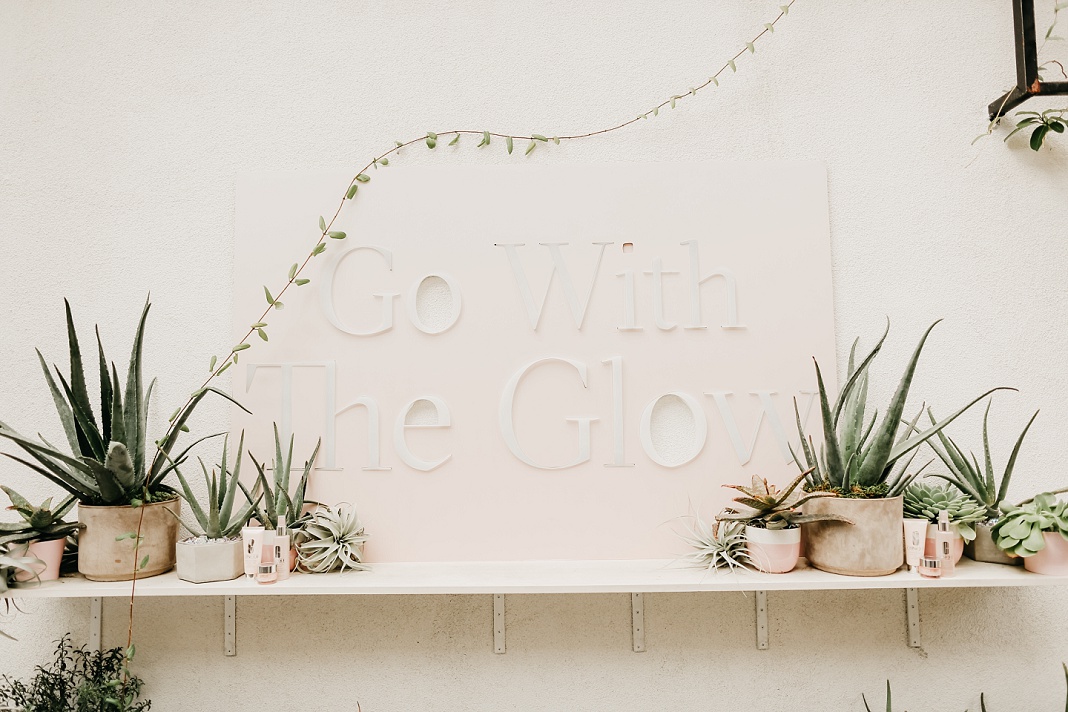
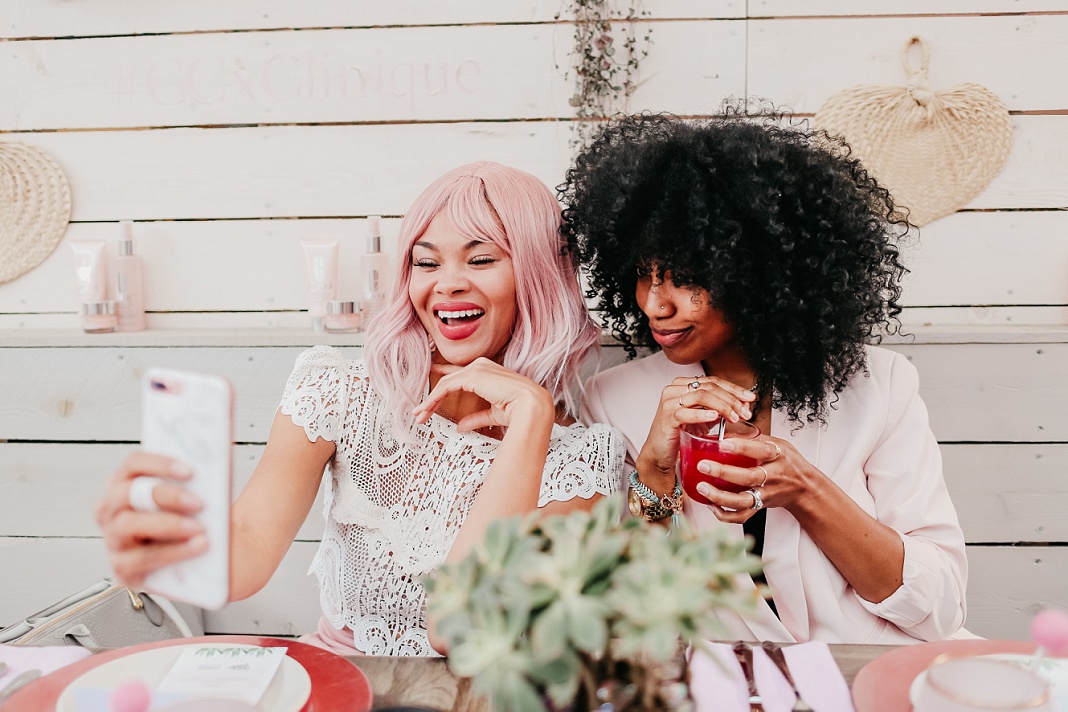
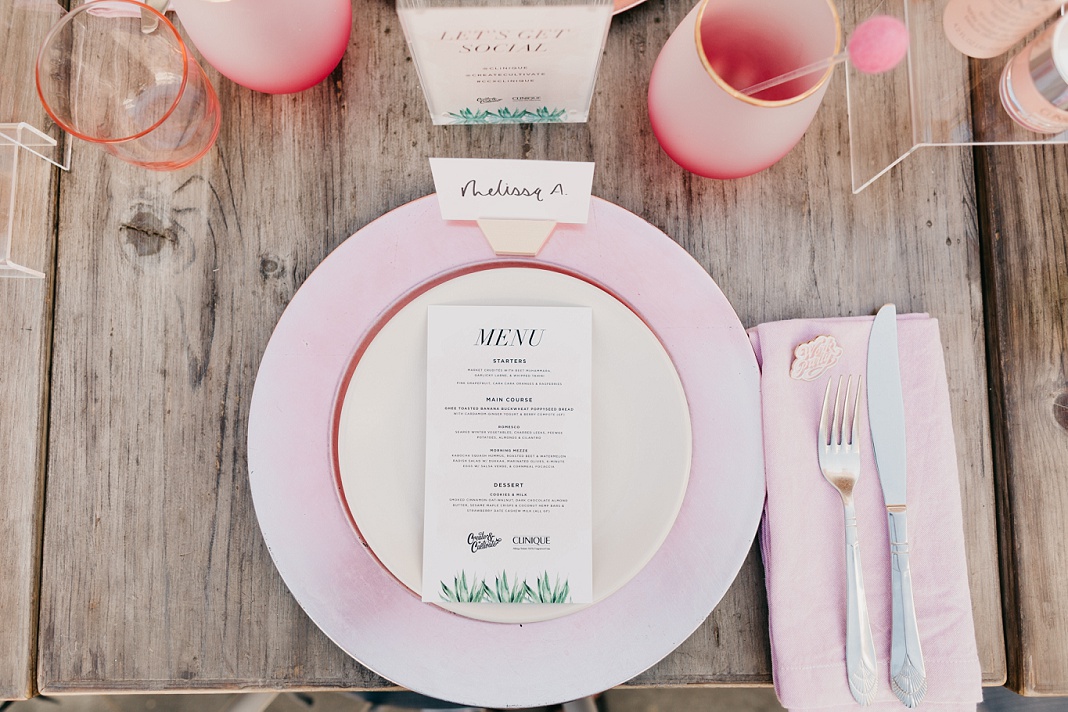
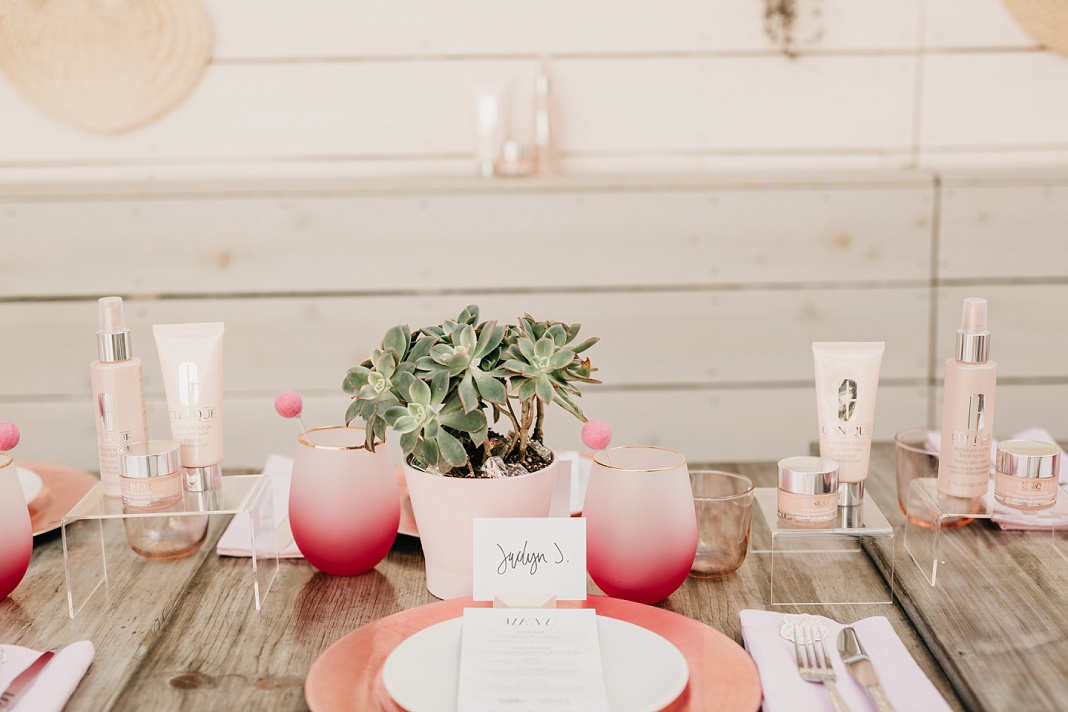
Destiney aka: Mom Crush Monday told us that Moms all around the world epitomize beauty to her. We asked her and Denise Vasi how they are teaching their daughters about beauty.
Destiney says, "Moms just radiate so much light and beauty to me. I teach my daughter about beauty through affirmations. We talk about being beautiful from the inside out."
Denise Vasi shared that when teaching her daughter about beauty, "The most important thing I want her to know is that beauty starts from the inside and whatever natural state she's in at any moment, that is when she's the most beautiful."
Specs and Blazers aka: Nike shared with us that she feels the most beautiful, "when I'm creating and writing for my blog."
Sazan says her two-month-old daughter epitomizes beauty to her, "because she's perfect!" We believe it.
Melissa Alatorre's definition of true beauty is, "Being confident in who you are and being yourself and never changing because you are unique and beautiful just the way you are."
Sophie Elkus and Simply Bianca Alexa both say their mothers define beauty for them. Sophie loves that her mom is caring and cooks for her. Moms are the best.
Bianca shared that her mother and grandmother epitomize beauty for her, "because they're such strong and powerful women and ever since I was little they've taught me to be comfortable in my own skin and to love who I am."
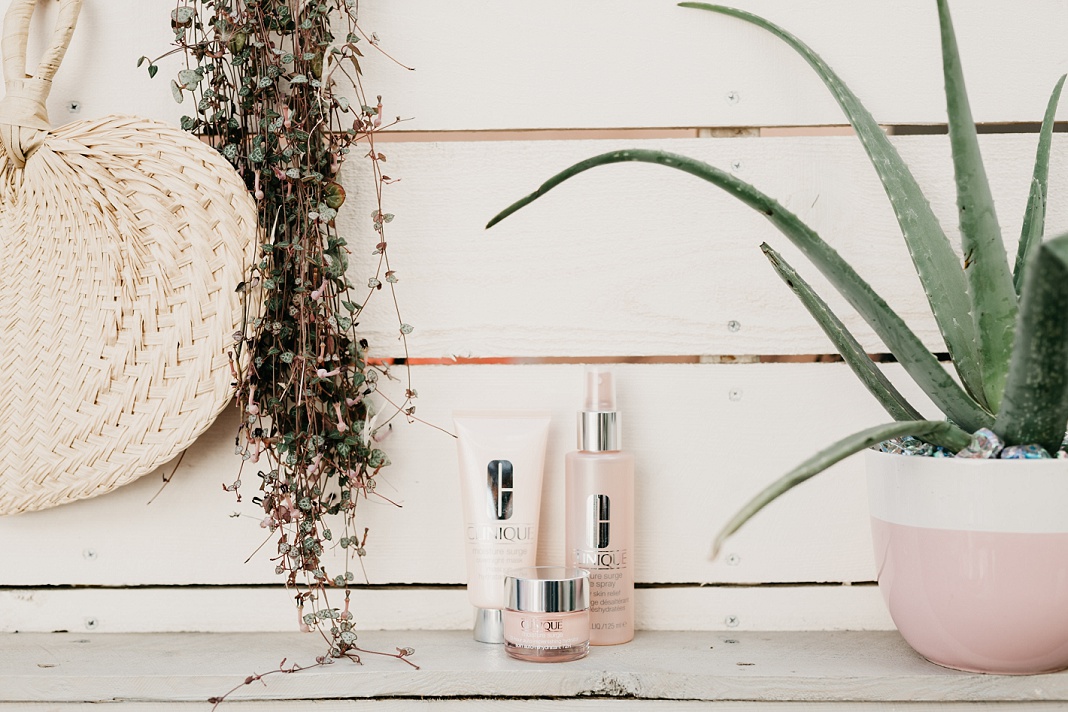
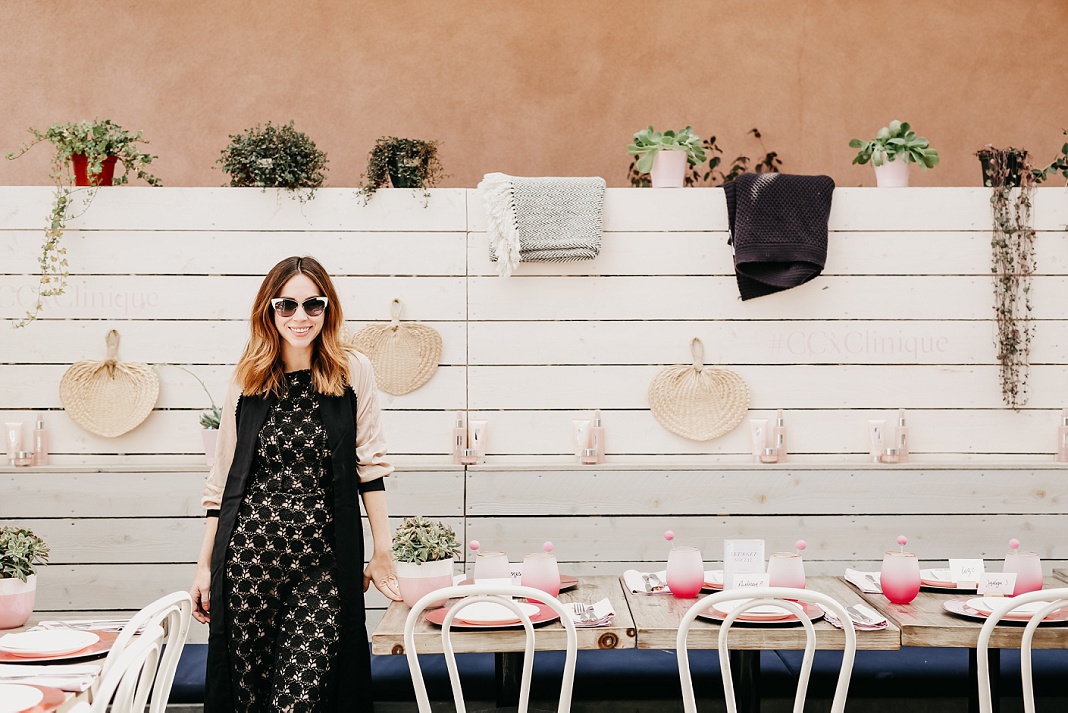
MORE FROM OUR BLOG
Create & Cultivate 100: Beauty: Shiva Rose
THE NON-TOXIC NINJA.
THE NON-TOXIC NINJA.
Shiva Rose is holistic and happy.
Almost a decade ago Iranian actress Shiva launched her beauty platform, The Local Rose, a platform celebrating a holistic, healthy life style without sacrificing taste & glamour.
She's dealt with divorce, major health issues, including lupus and other autoimmune disorders, and the grief of being told she only had a year to live at 26, but Shiva's personal agenda and holistic messaging includes taking responsibility for her own health. And her life. She's been a fighter from the beginning. Raised in Iran until the age of ten, Shiva and her family were forced to escape to Paris. They then moved to Los Angeles, where she remains today.
Now the wellness-and-beauty entrepreneur heralds her brand Shiva Rose Beauty, which creates 100% toxic and chemical free skin, body and beauty products, handmade in California and Oregon, USA
Her book Whole Beauty is coming out next Spring.
More from the Shiva goddess below.
Name: Shiva Rose
Instagram Handle: @localrose
Business Instagram Handle: @shivarosebeauty
What does beauty mean to you?
Beauty is what we choose to see, how we choose to live, what we want to cultivate in our lives on a daily basis. The ability to see beauty in the most simple moments, and to live in that is the ultimate gift.
Do you remember a moment when you first felt beautiful?
I think I have always felt most beautiful when connected to the natural world. There have been moments when I've been soaking in some wild hot springs with dear sisters, and have felt totally divine and in my feminine beauty.
"I have always felt most beautiful when connected to the natural world."
Tweet this.
Where do your drive and passion come from?
From my connection to the source. From being in nature. From wanting a better world for my daughters.
What was the impetus for launching The Local Rose?
I started my holistic lifestyle brand before wellness was becoming mainstream. I began it 9 years ago to document my path towards healing from various autoimmune issues. I felt at the time there were not many sites that showed wellness and holistic living in a chic, modern way. I wanted to also bring some love to the many wonderful artisans and healers I was meeting.
What are your biggest fears about running a business?
I try not to think or live in fear. It's a daily practice to substitute love for fear but it can be done with conscious thinking and meditation. I would say some challenges that I do come across are having the stamina and strength to deal with the heavy load. We must create strong nervous systems so we can hold the space for success and abundance.
"I try not to think or live in fear."
Tweet this.
What's something you'd like people to know about your job that they probably don’t?
That I do most everything from writing the posts on my site and making many of my products by hand. I also handle the day-to-day dealings.
IYO-- How can we stay original when we are so saturated with other people's work?
Listen to your unique, authentic intuitive guide. Truly don't do something just to make others happy, but something that lights you up in a deeply powerful way.
Don't do something just to make others happy, but something that lights you up in a deeply powerful way.
What about your career makes you feel the most complete?
When I receive emails from people who have tried the line and see that it works for them. Also from the comments on my blog about certain stores that have touched them. My book Whole Beauty is coming out next Spring and that makes me feel pretty complete, at least for the moment.
If you had to trade jobs with anyone else in the world, who would it be and why?
To be honest I love what I do and truly don't want to trade with anyone. I would just like to create more of this and bring some healing to people in pain. I have been in the depths of despair from divorce, from health issues, from childhood traumas and I want to just let others know that there is a light at the tunnel, once you realize you are the light.
At what point in your career did you find the confidence to really take charge and become the woman you are today?
I feel it was a gradual journey where I began to listen to my inner voice and guide. I did have a light bulb moment after a Kundalini class to create my beauty line. It wasn't so much confidence, but rather deep knowing that this was something I would do. I feel when we open ourselves in meditation, our egos get out of the way and our spirits or souls will guide us.
What's the best advice you've ever been given? Or your favorite piece of #realtalk?
I Say Yes to life and life says Yes to me!
When you hit a big bump in the road, how do you find a new road or a detour?
I take a moment a feel the bump fully. I then will take some time away to refuel myself with the love I receive from mama earth and father sun. I also will try to take a Kundalini class by one of my teachers. These things will usually realign me and help me get back on my path.
What song do you sing in the shower when you’ve had a bad day?
Usually mantras! If not mantras then I love the music of Van Morrison, Dan Dyer, Zeppelin, classical and the blues.
Photo Credit: @davisfactor
Hair & Makeup: @SmashboxCosmetics @TheGlamApp @TheOuai
TO SEE THE FULL CREATE & CULTIVATE BEAUTY LIST CLICK HERE.
Exclusive Interview: Meet the Woman Behind a Billion Dollar Biz
Plus a totally exclusive Clinque giveaway.
As the granddaughter of Estée Lauder, the co-founder of the cosmetics company Estée Lauder Companies, Jane Lauder grew up on the front lines of the beauty industry. Today she serves Clinique as Global Brand President.
"It’s my aesthetic," Lauder shares of the iconic American brand. "It’s so simple but so incredibly effective." Working with such an iconic brand can be challenging, but Lauder maintains that “when my grandmother started this company and for her it was always about quality. Quality never goes out of style. Brands come and rise up, but people always come back to quality."
"Quality never goes out of style."
Tweet this.
Prior to her leadership role with Clinique, she oversaw the Origins, Ojon and Darphin brands. Under her leadership, Origins, grew significantly and expanded globally. And yet, she's returned to her Clinique roots, the brand she first worked with when joining the company in 1996.
"It’s always modern. It never feel dated, it always feels relevant," she says. "I've always loved the simplicity. It looks so simple but everything going on underneath is what makes it so impactful. It’s kind of like your iPhone, it looks so chic but it’s all the things behind-the-scenes that make it that simple."
Most recently Clinique collaborated with beloved designer Jonathan Adler on #CLINIQUExADLER, an exclusive new makeup collection styled by the design guru. "We are always looking at brands that we want to collaborate with, Lauder says. "Brands that have the same aesthetic and that are great American icon brands." How Clinique decides on partnerships is fairly simple. "We sit as a team and put down on paper the people we think are incredible and would love to work with. Sometimes it works." Adler was top of the list. Beyond his obvious style chops, Lauder notes that Adler's "tiny treasures, big pleasures," idea is what Clinique makeup is all about. (Scroll through the below album for exclusive pics from our Create & Cultivate brunch with Clinique at Jonathan Adler's Shelter Island home.)
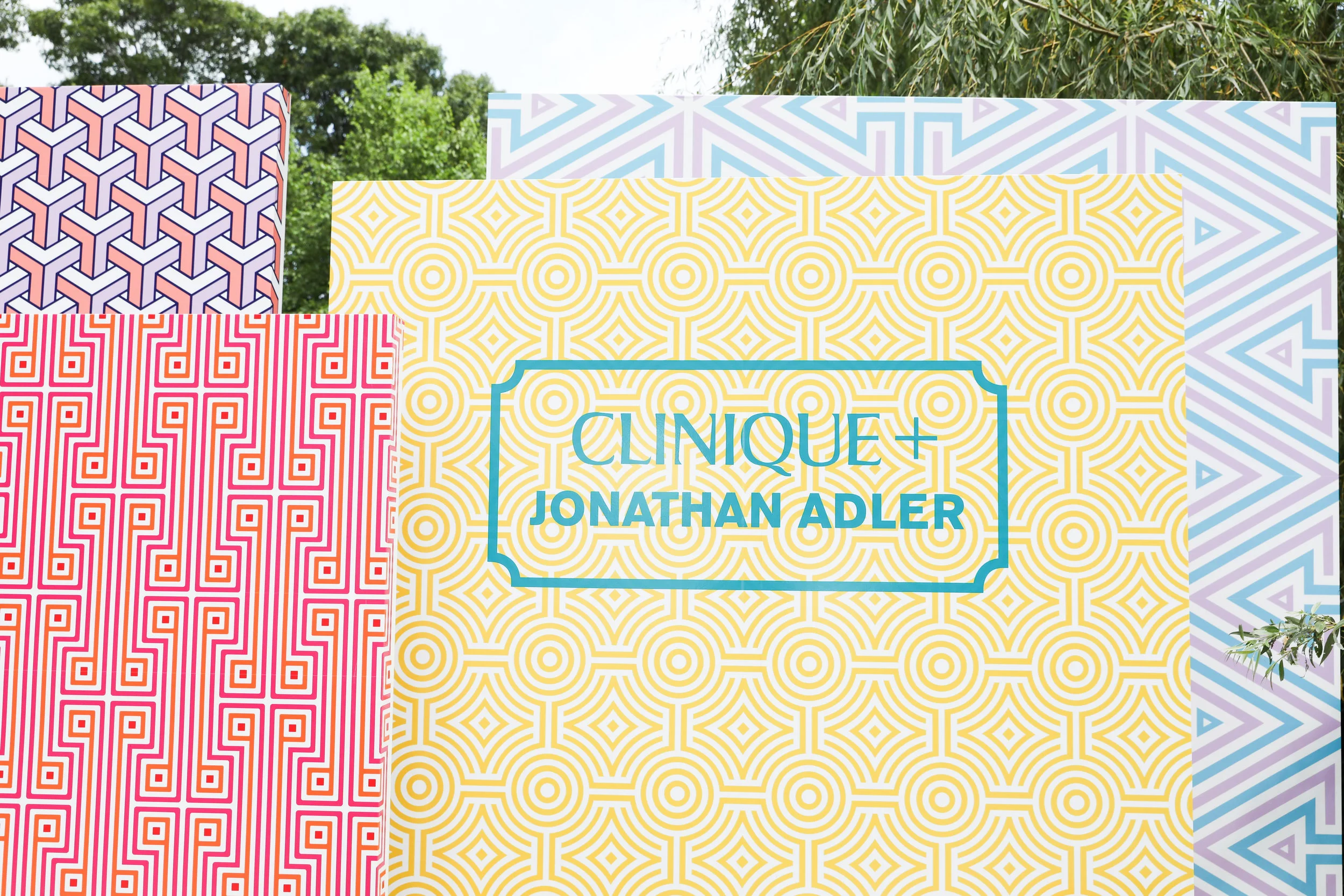
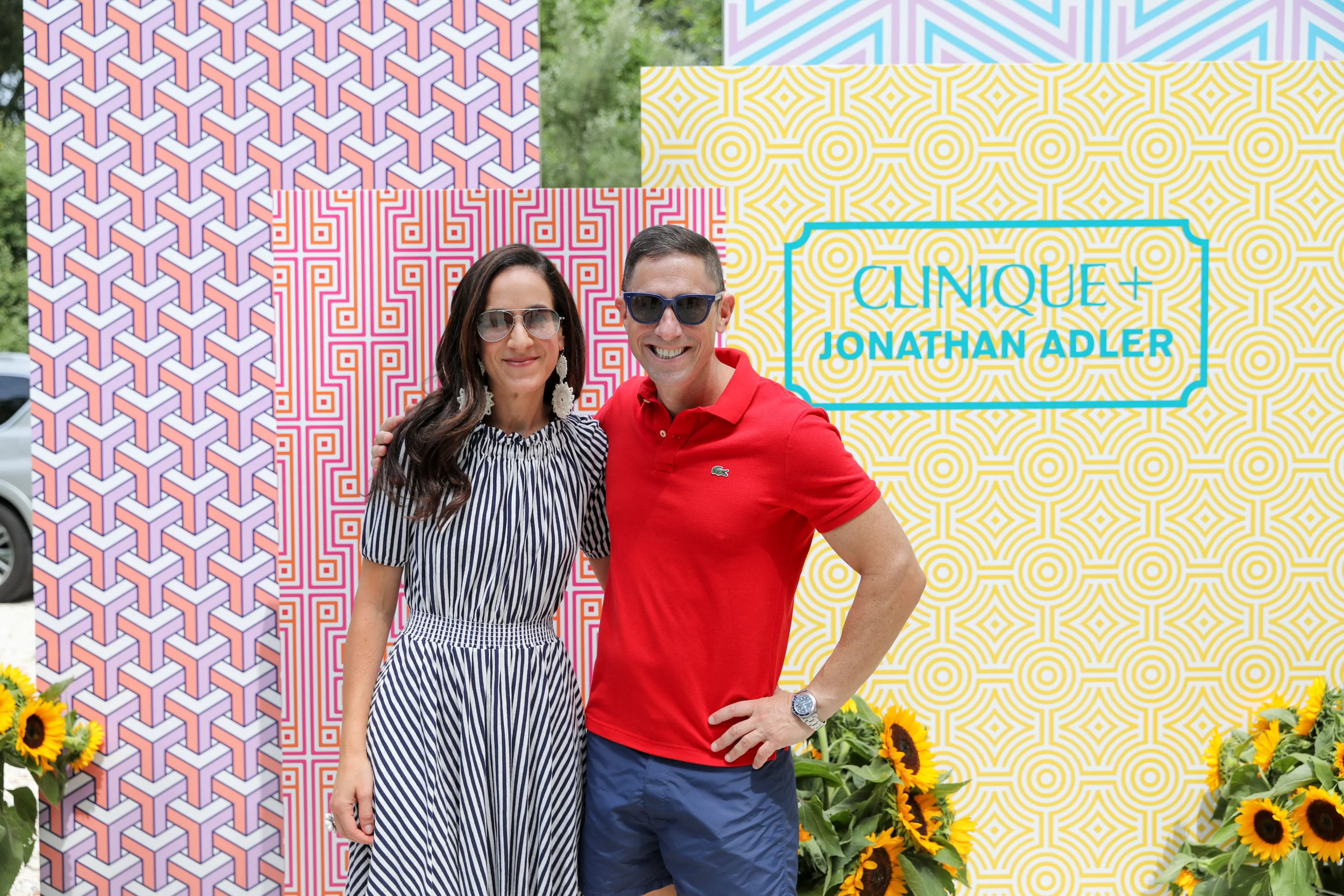

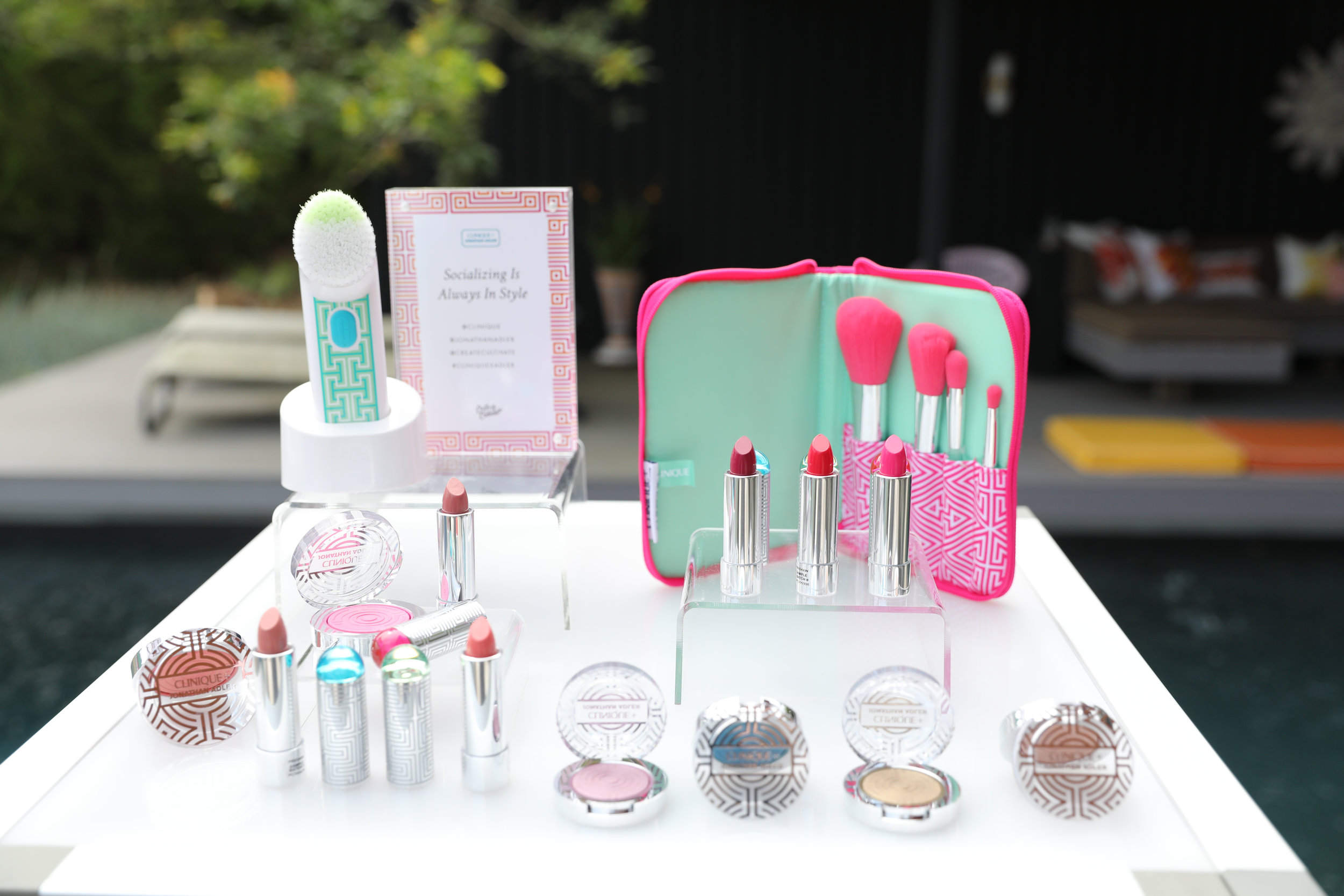
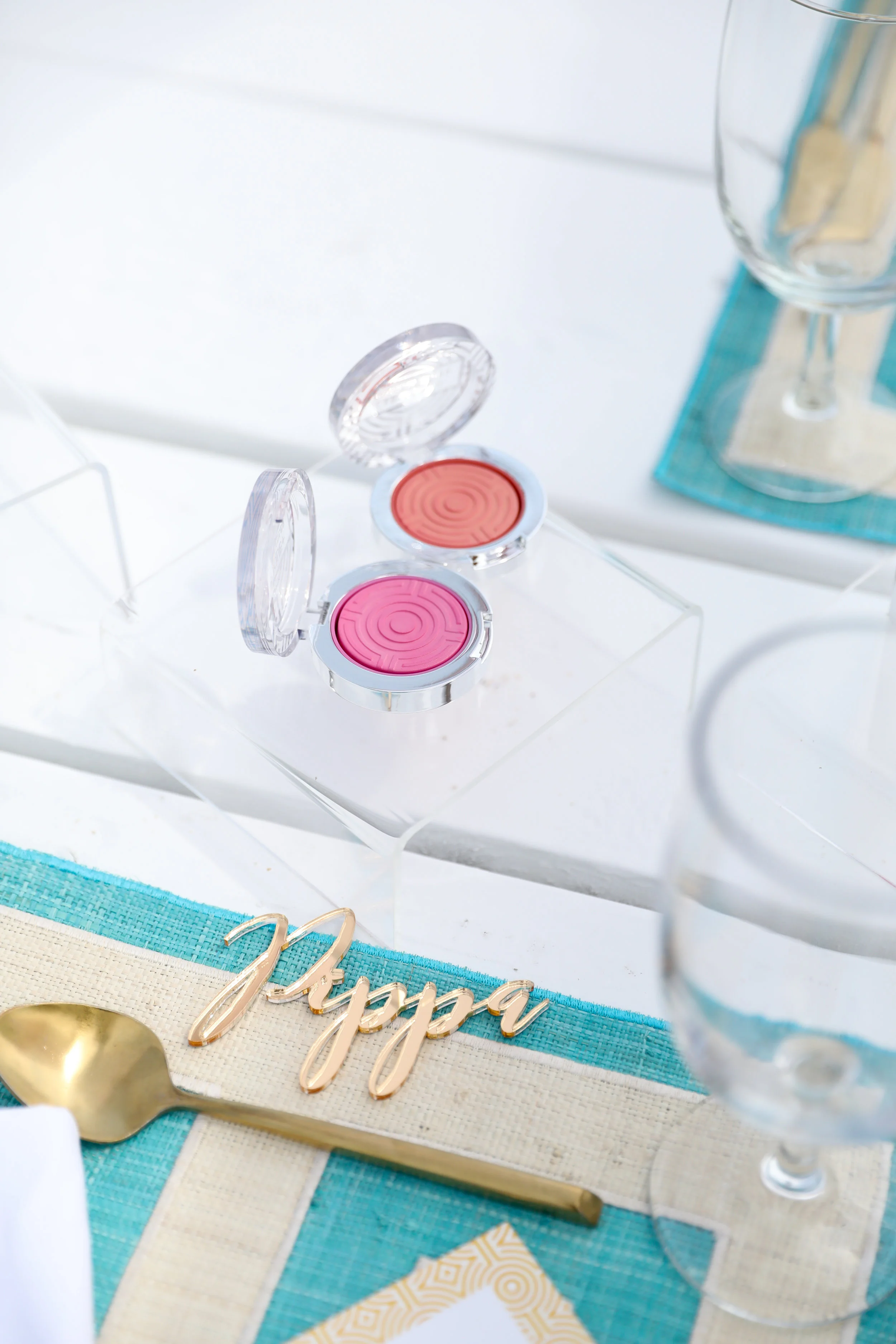
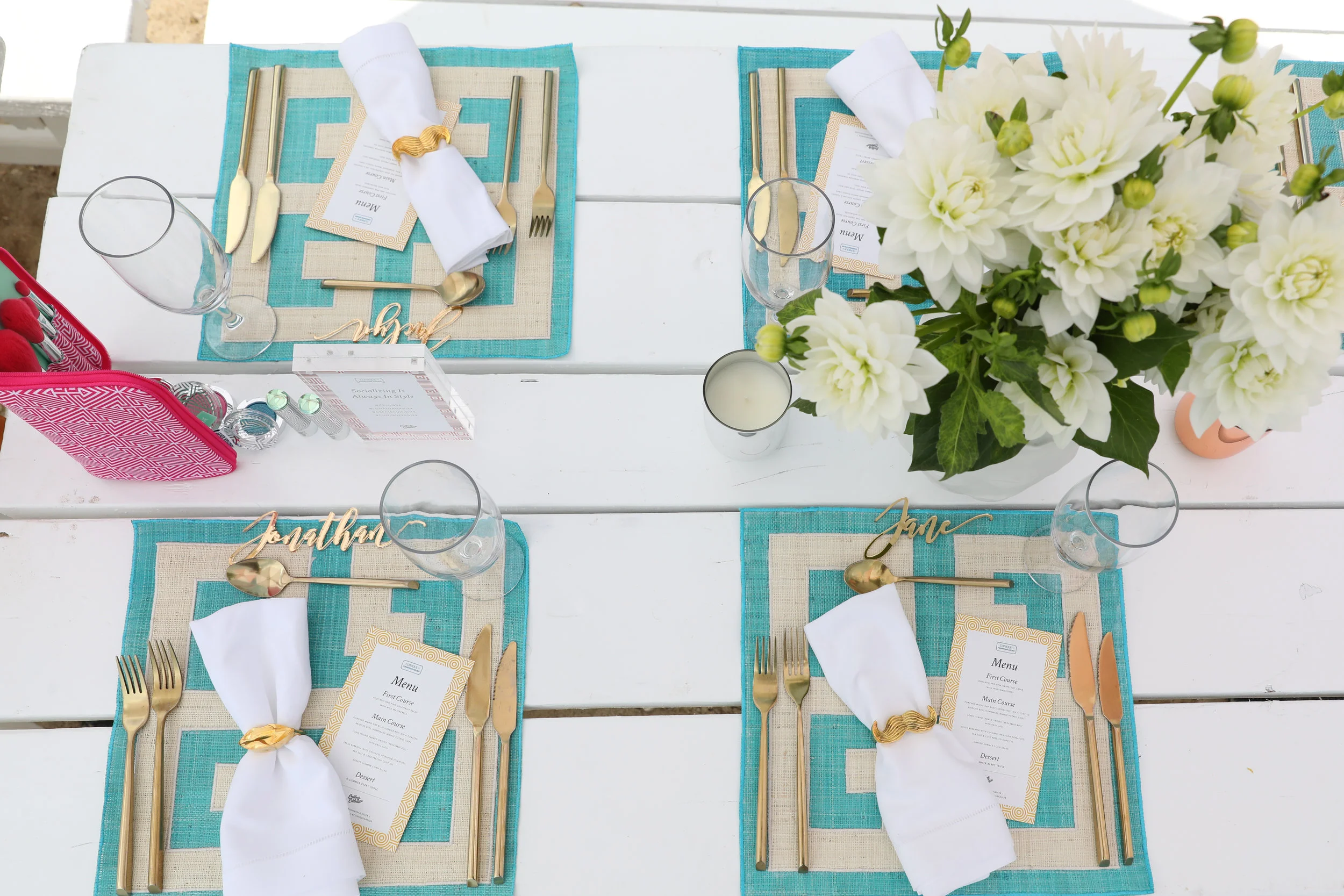
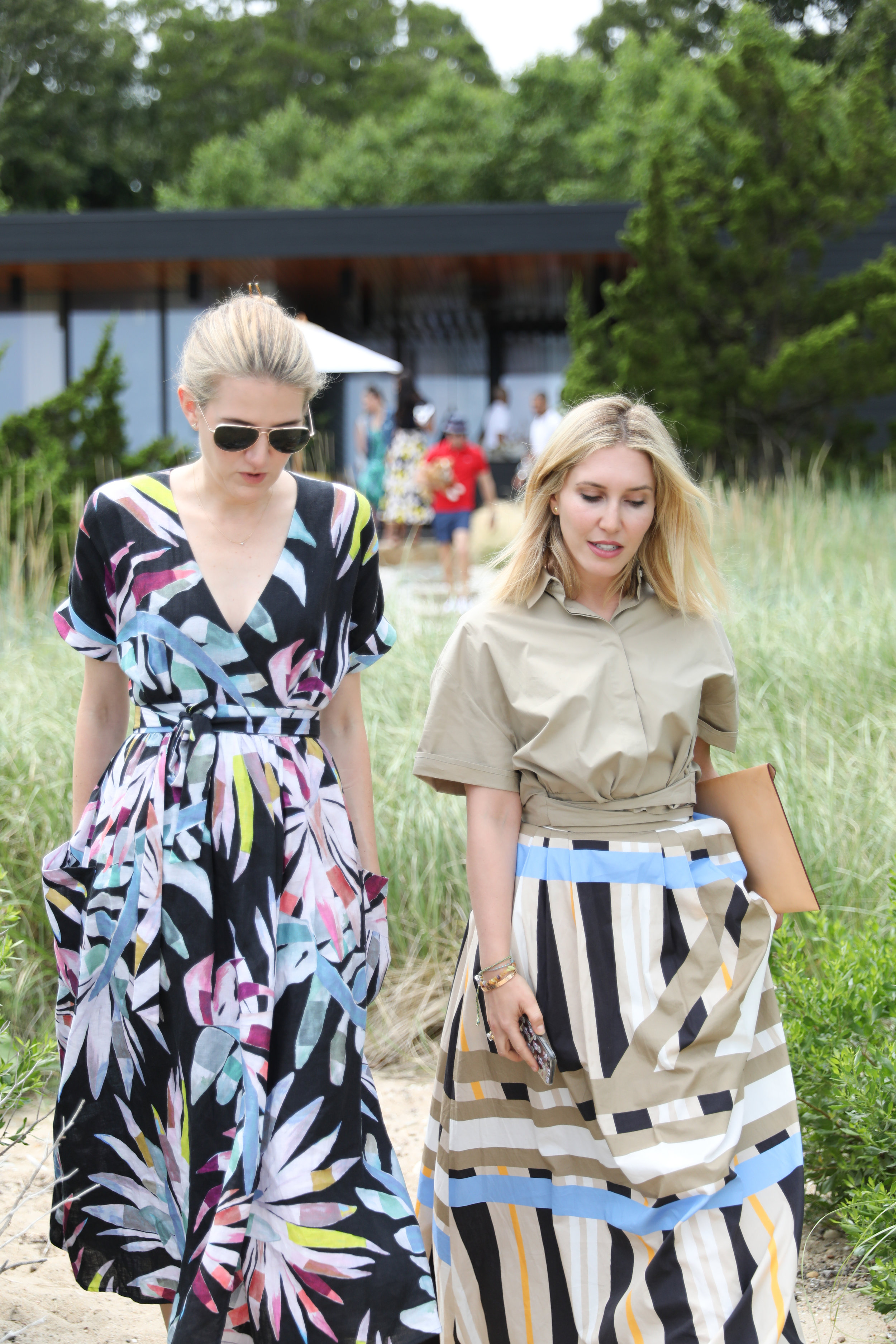
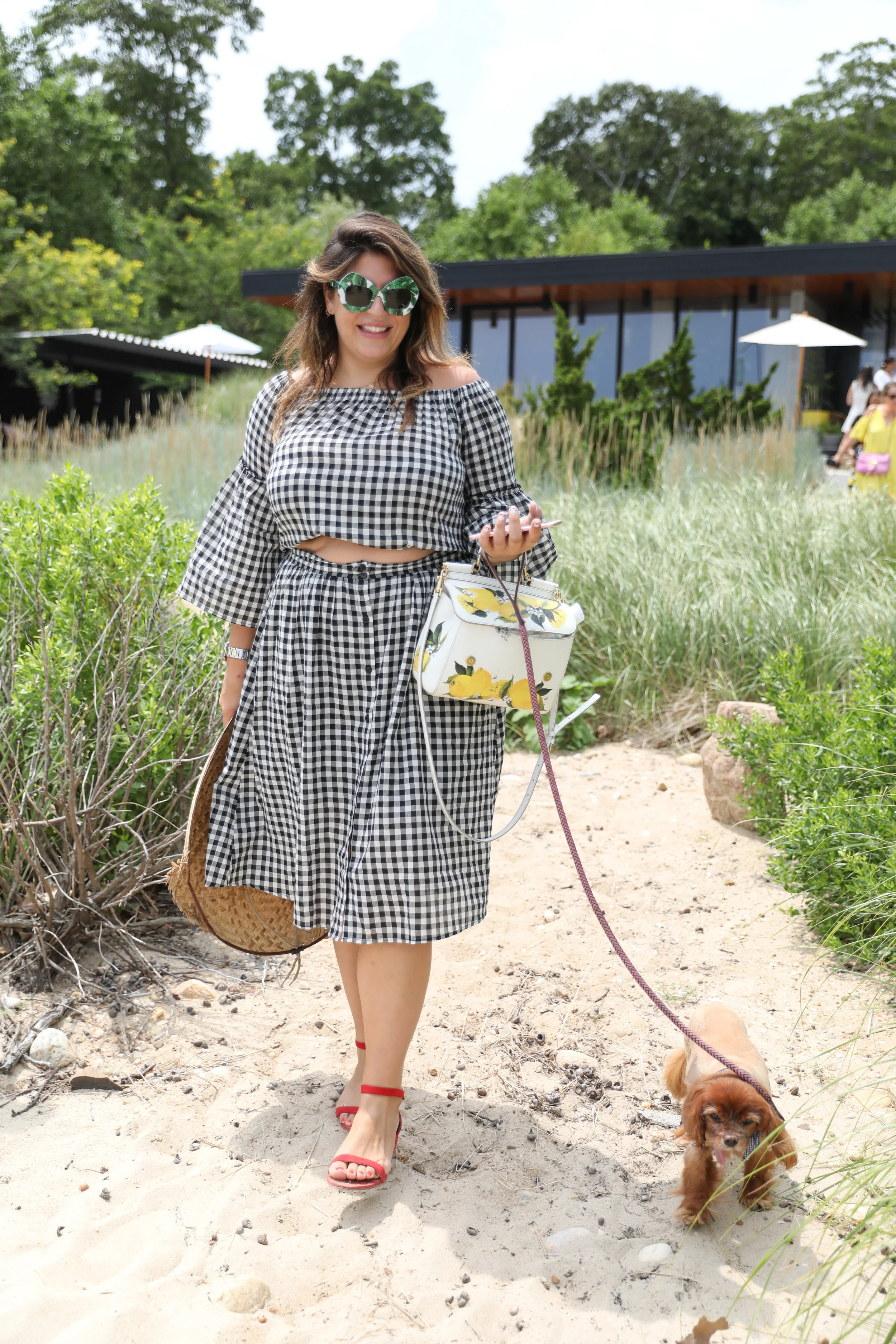
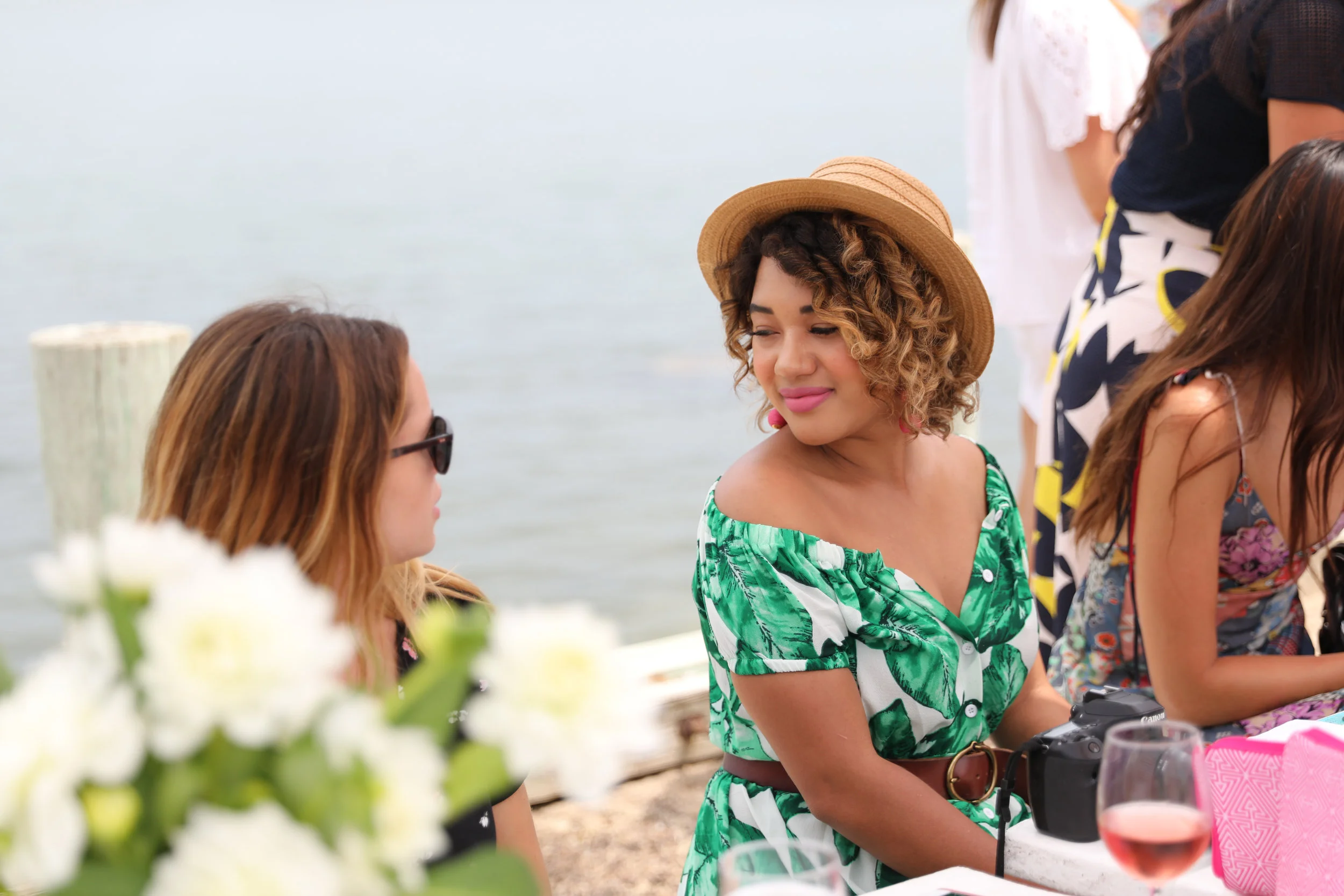
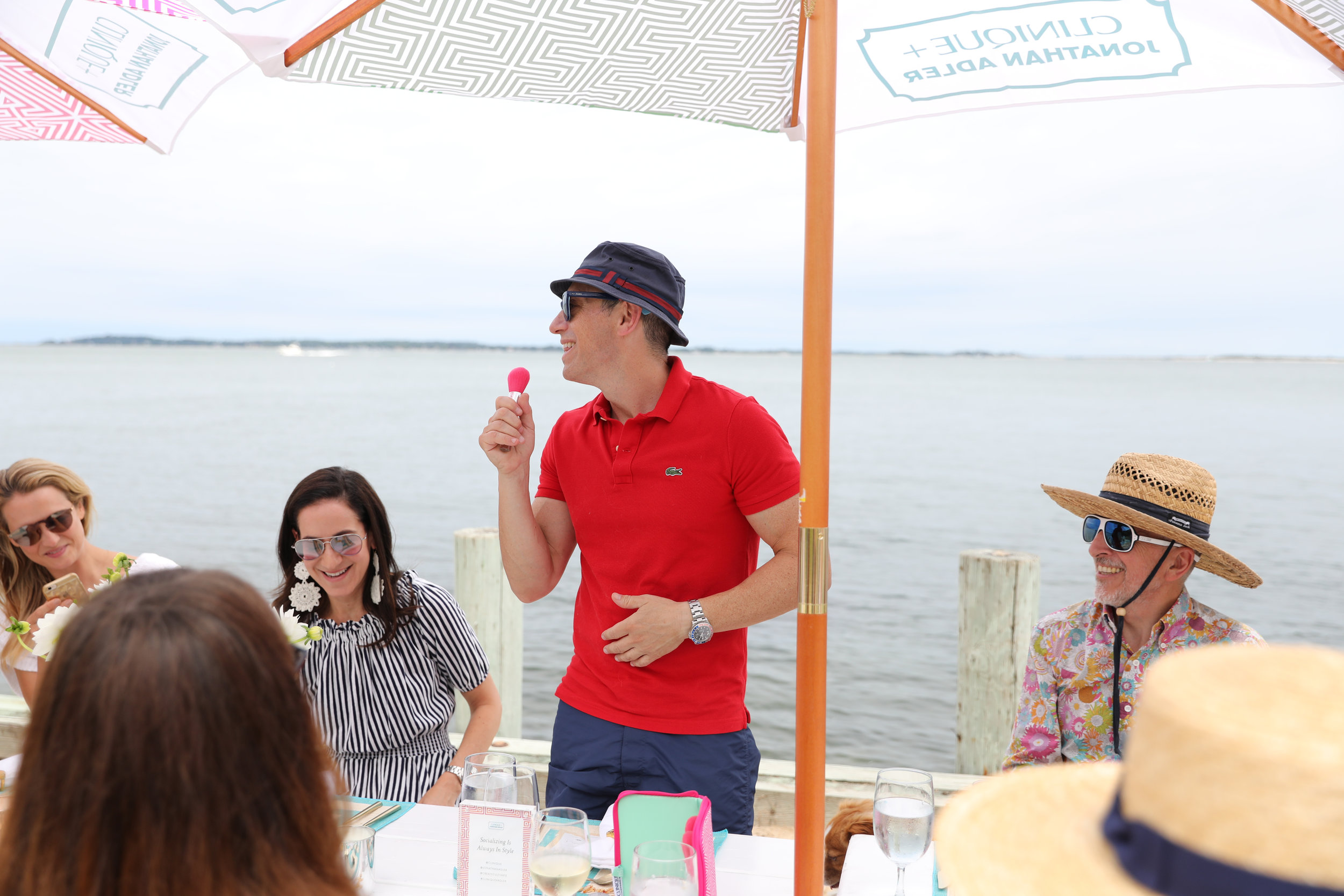
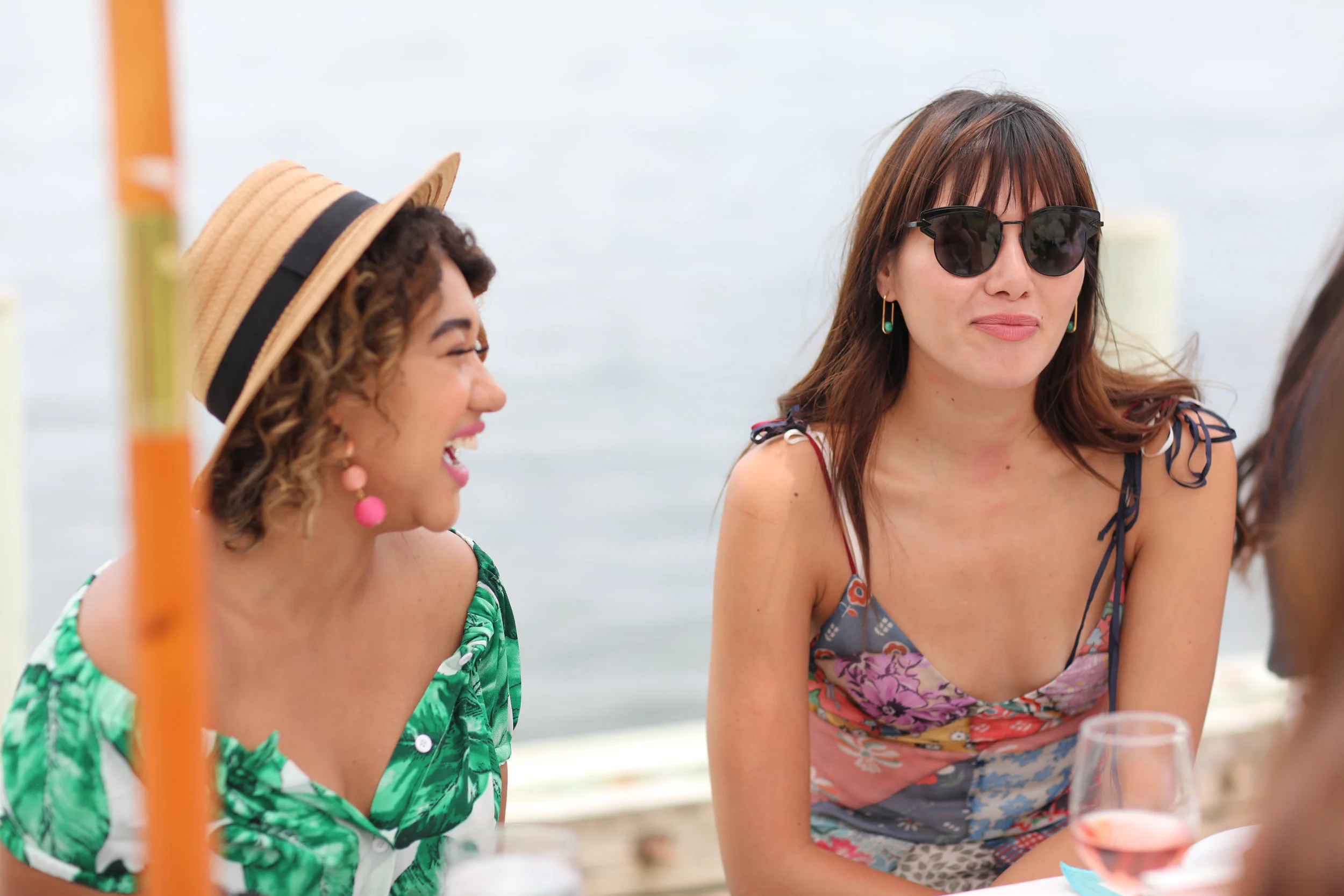
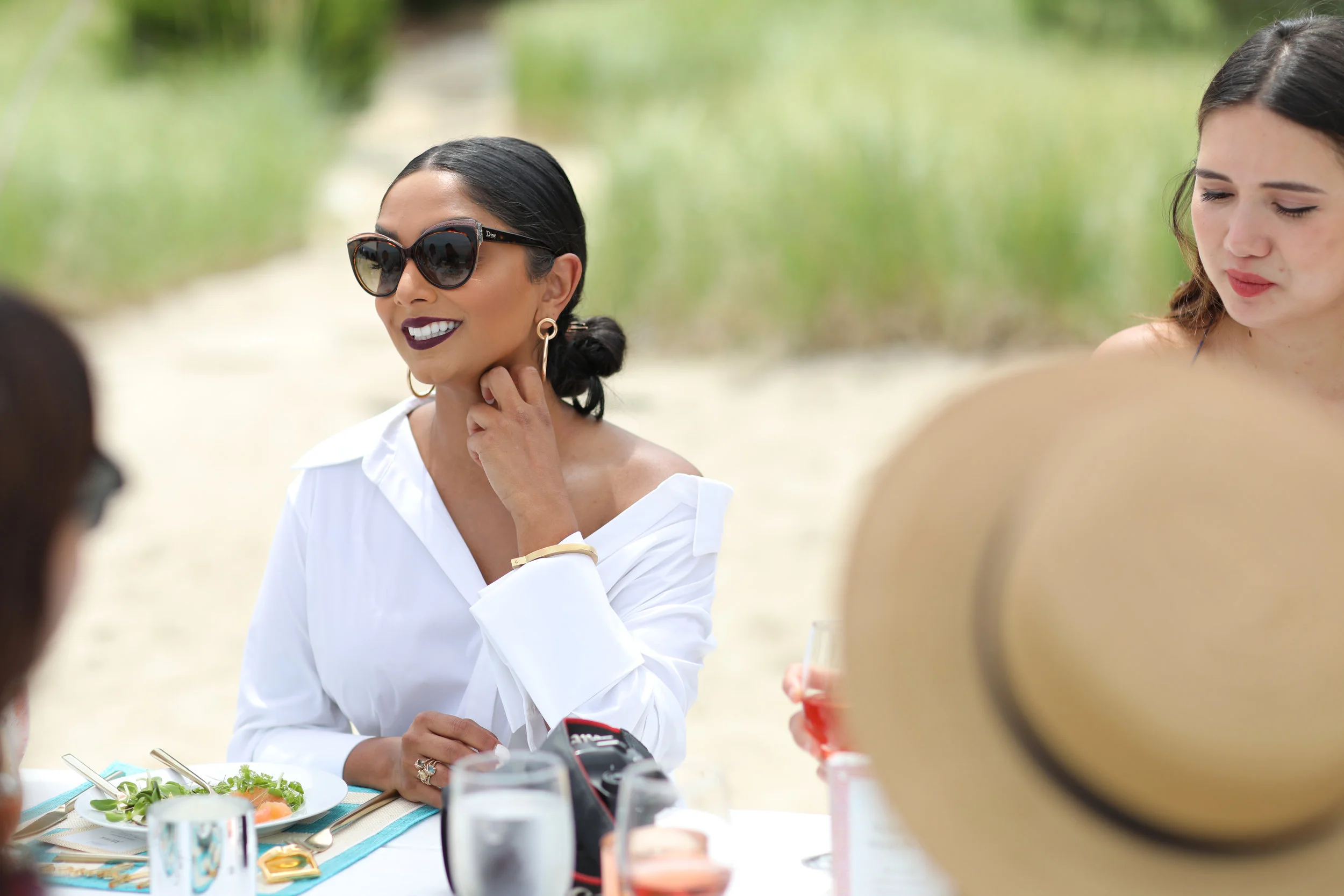
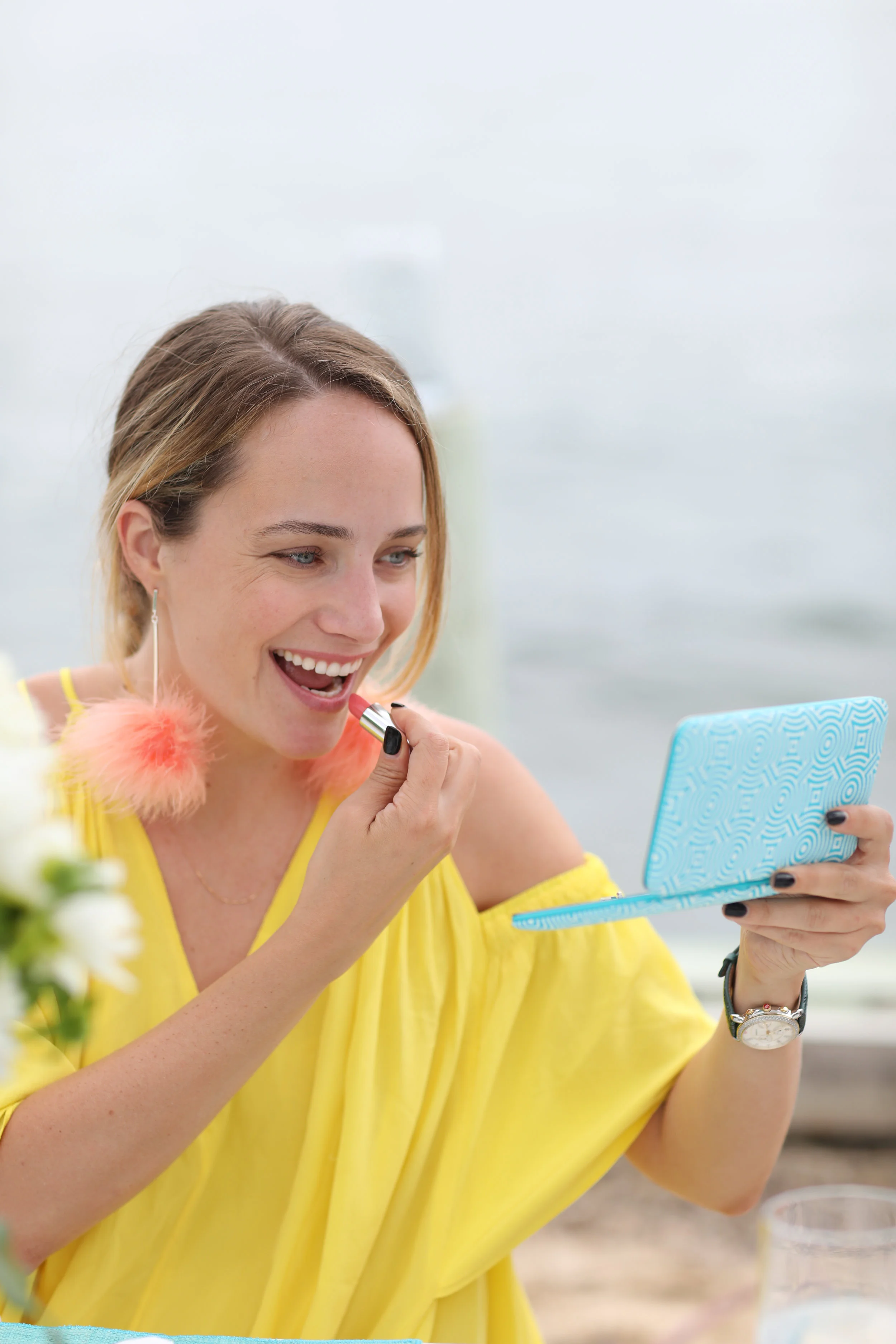

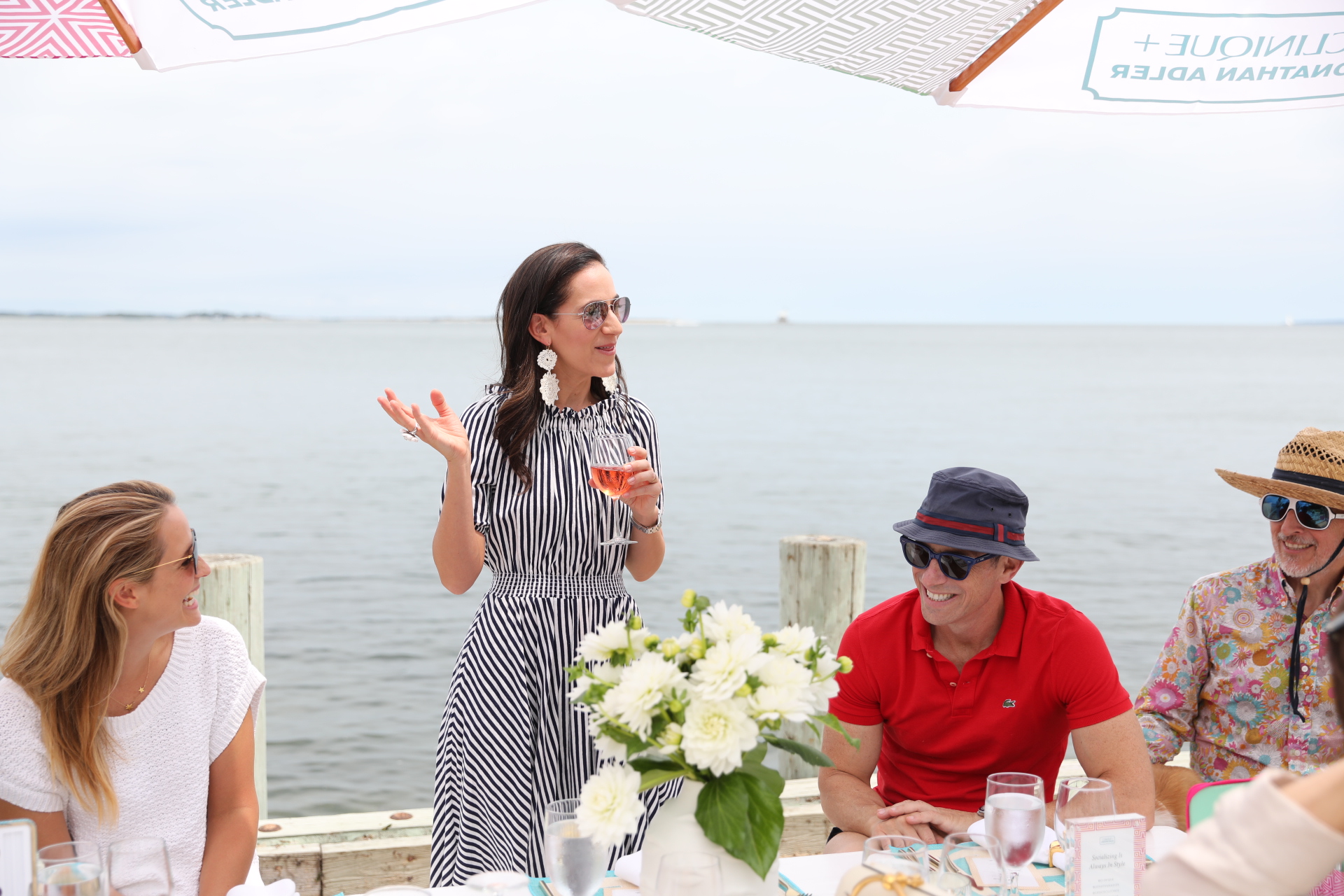
"It’s so important that we’re really listening to what these women want," she explains. "The hardest part about this brand is that people fall in love with a product and they take it super personally if you try and discontinue anything. Even if it’s only 300 people that are buying it, it’s really hard for us to move onto something else. We only discontinue something that we’re sure we're replacing with something better. You never get rid of the classics, but we are constantly thinking about how to make our products better. WE always want to TOP ourselves.”
That includes the collection with Adler. This marks his first foray into beauty. Inspired by '60s pop and Adler's signature geometric and poppy style, Lauder says, the collection includes "A simple silver case that can give you so much pleasure with the right color in it." She also "obsessed" with the brushes, gushing, "I love all the colors and wear all of them, but the brushes, I gotta have those pink brushes." The collection also includes several of Clinique’s best-selling makeup products in standout summer shades. His inspiration? His inspiration? “That iconic Clinique green has always signified freshness,” says Adler. “I wanted the collection to be bright, bold and fresh, and make women feel more glamorous.” Check the limited edition collection out here. (And enter to win a giveaway below.)
As for the brand, Lauder says, "We’re really trying to figure out who the Clinique customer is— every woman has had a piece of Clinique or used it. We’re noticing that the more mature millennial is our sweet spot-- a lot of women who are now taking care of their skin and going through life changes. They are getting married, having children, working, and there is so much going on in their that they want something that is a simple routine but gives them a remarkable result. Quality and effectiveness, but also that’s real.
Admitting that she had acne as a girl, Lauder knows that, "Skin is super personal and really emotional. When you wake up with great skin it’s really transformational."
"When you wake up with great skin it’s really transformational."
Tweet this.
And it always comes back to quality. "For us, whenever we’re creating anything it has to be of the highest quality. They have to be collaborators of the highest quality. Whatever we create has our name on the packages. As a company that is the most important thing.”






























